Lecture 4-5. The Morphological Structure of English Words
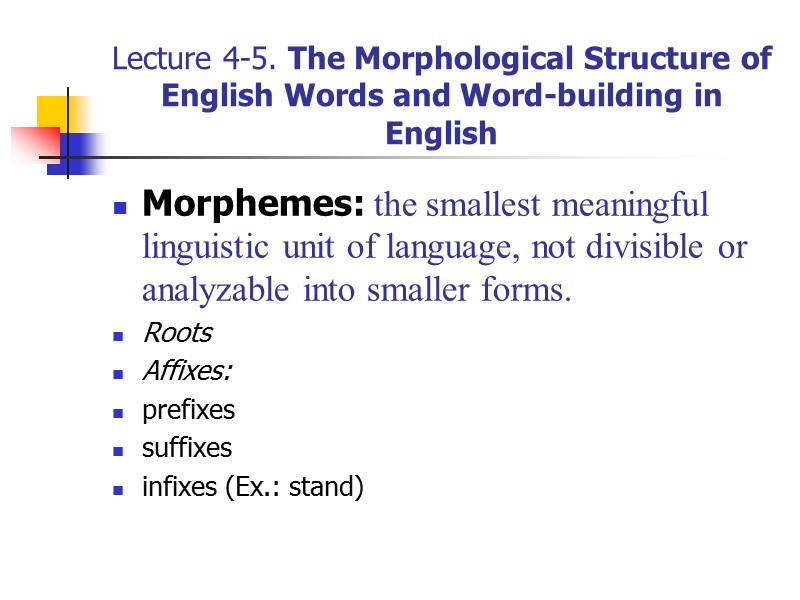
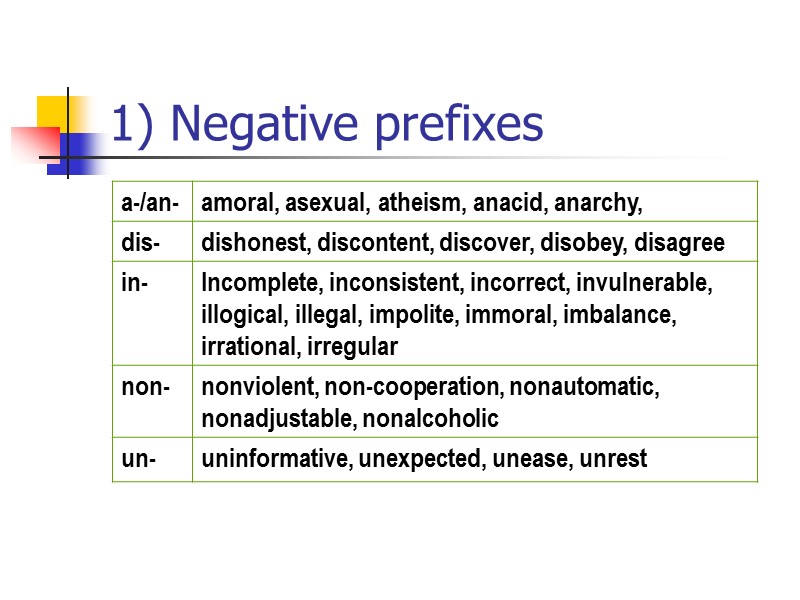
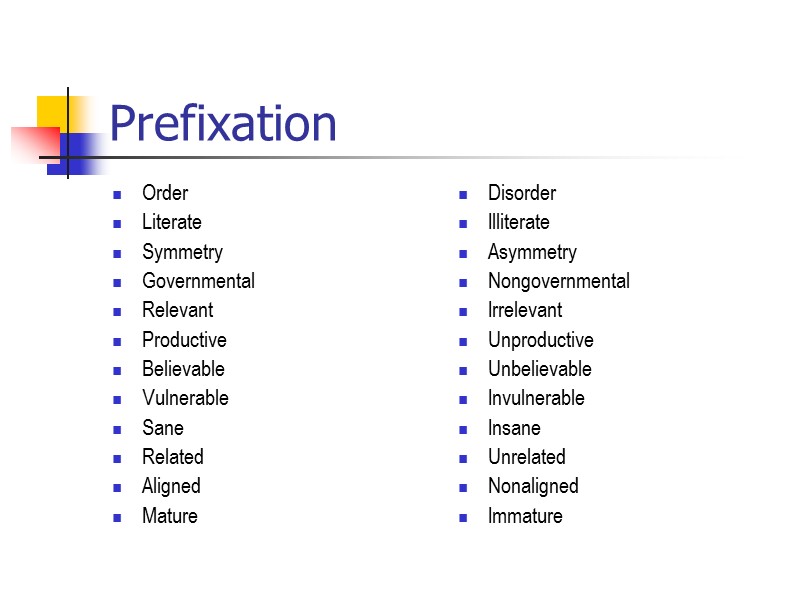
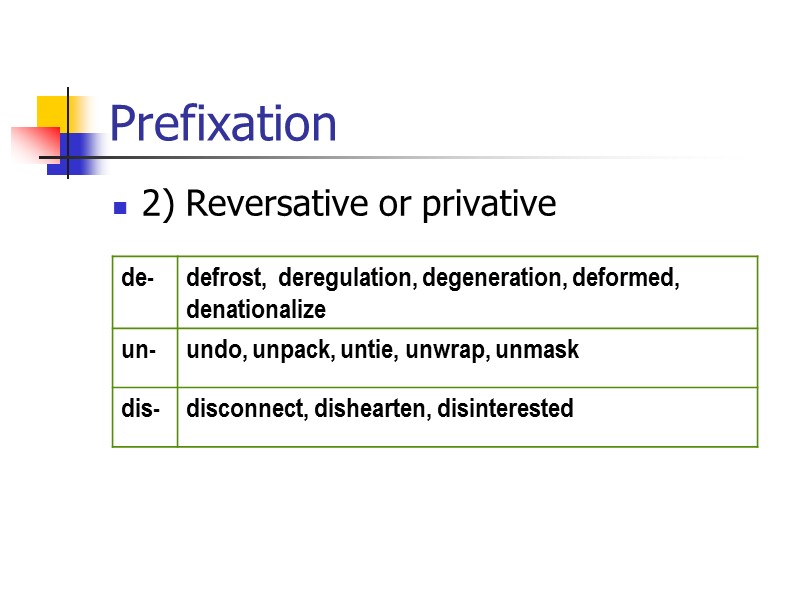
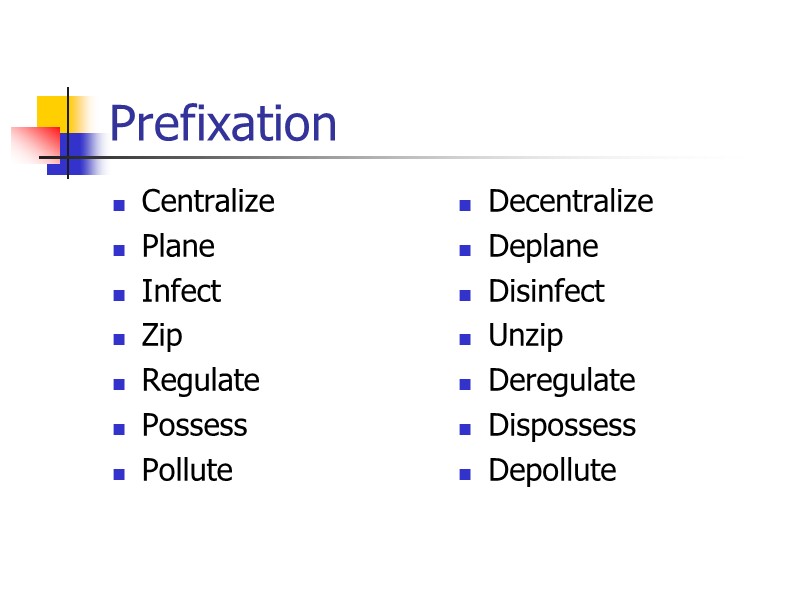
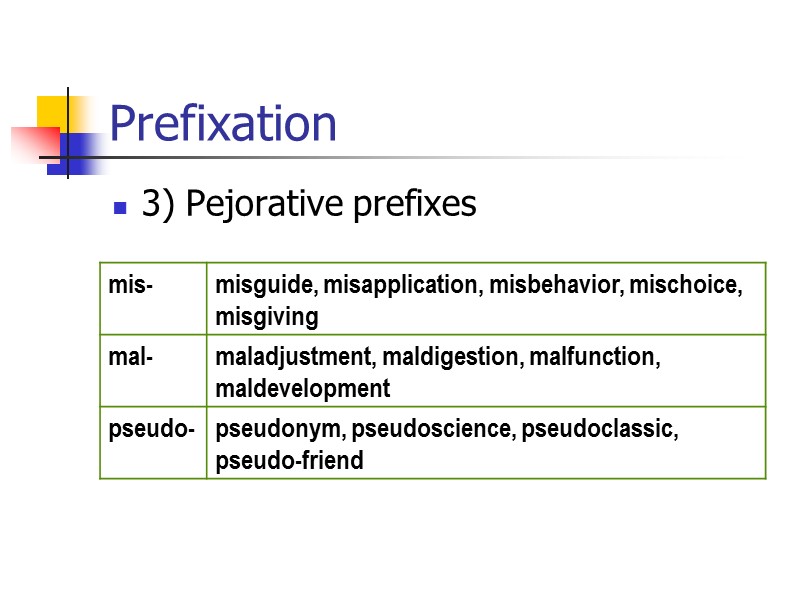
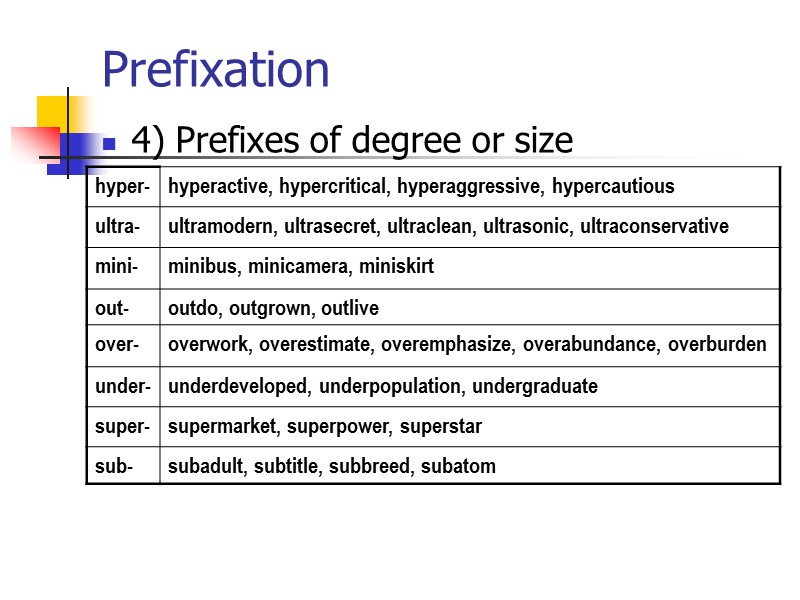
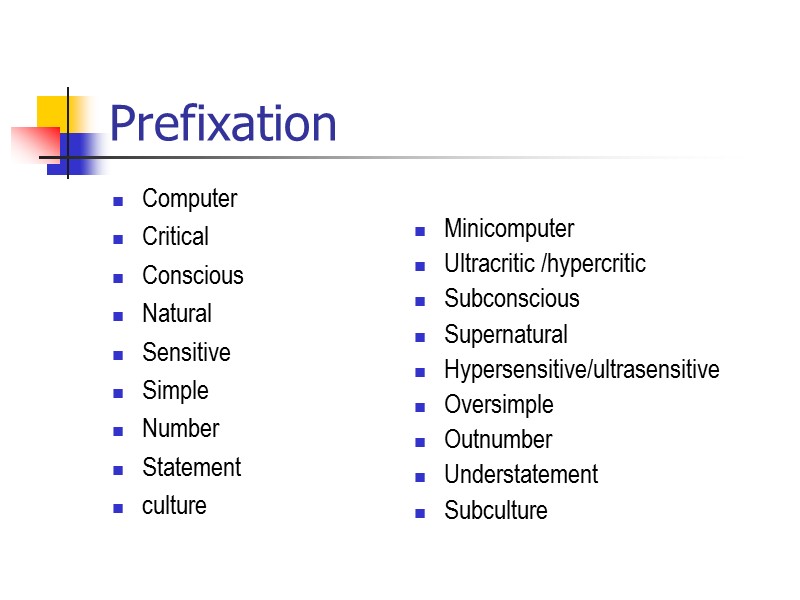
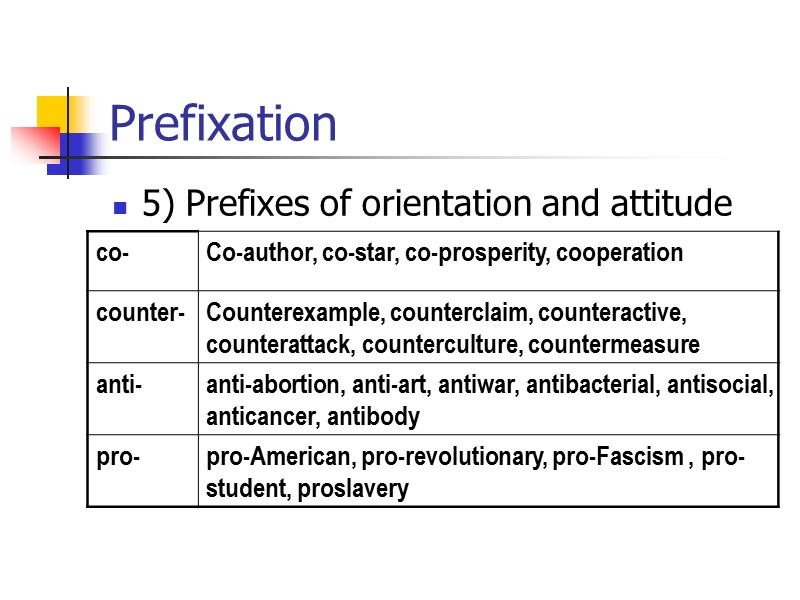
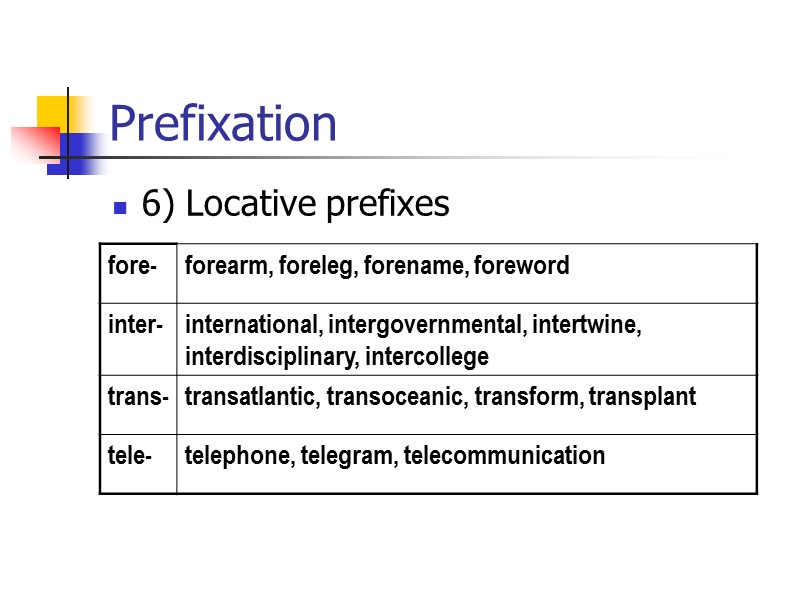

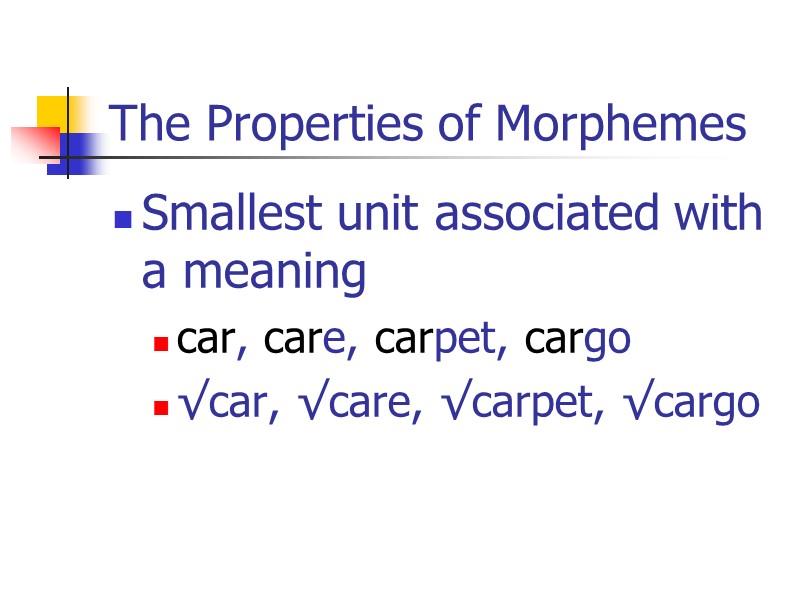
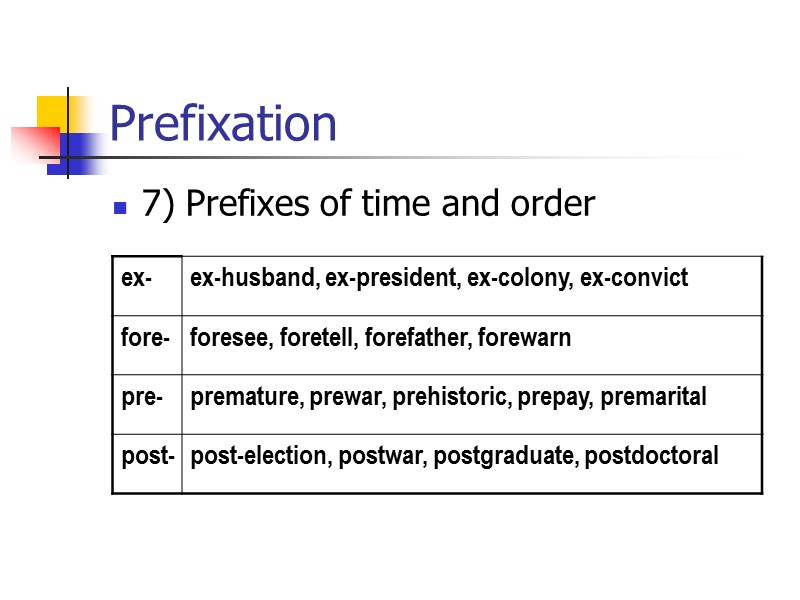
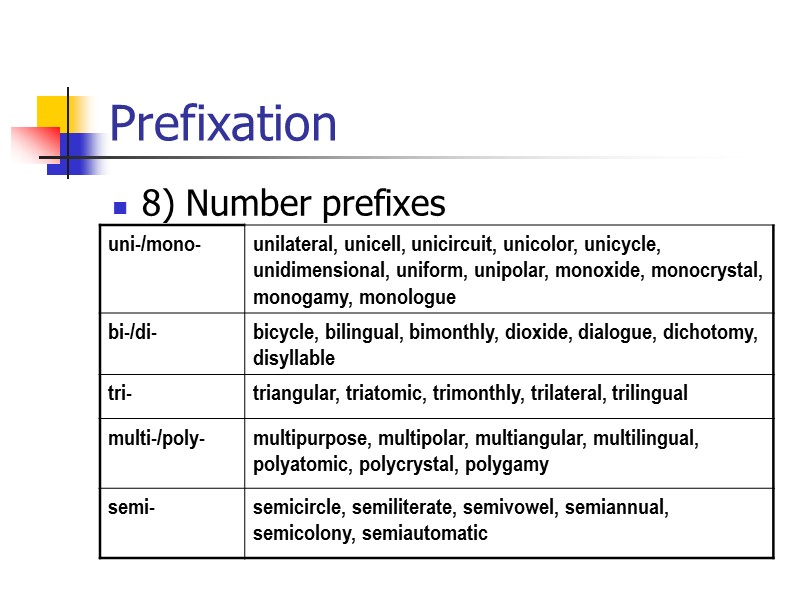
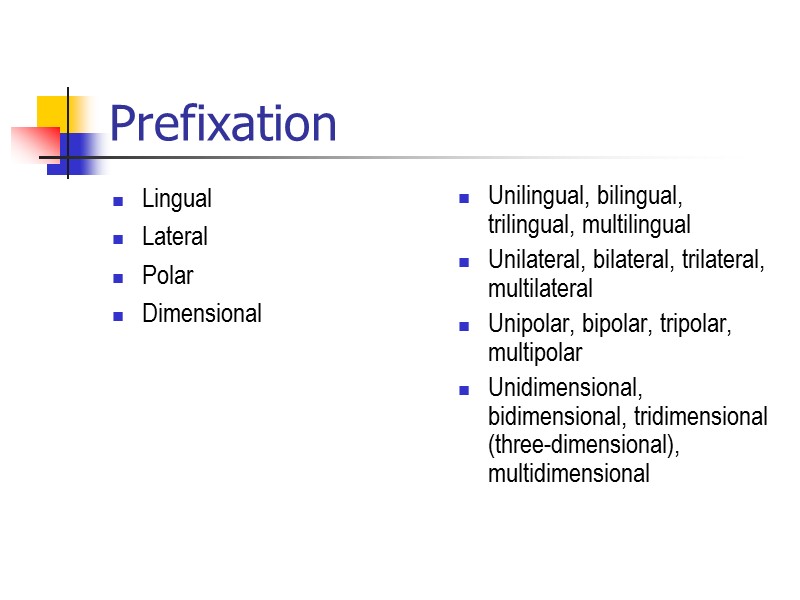
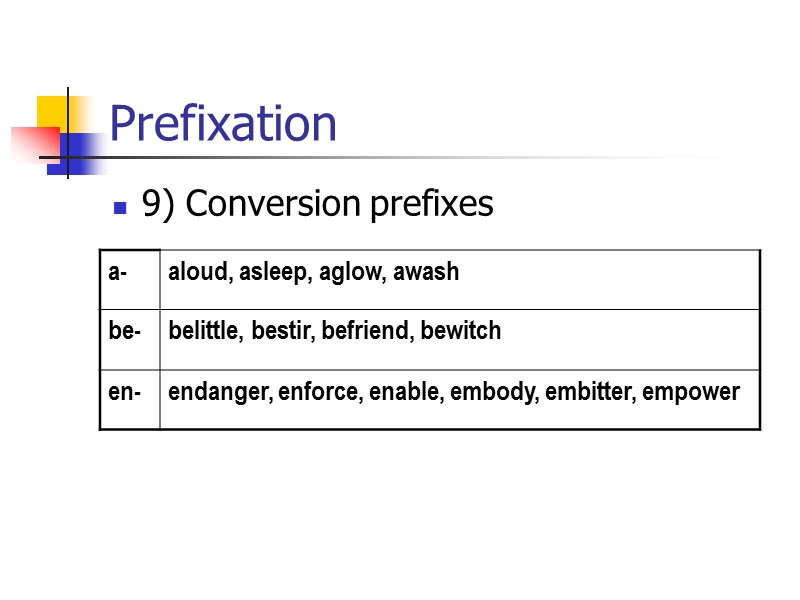
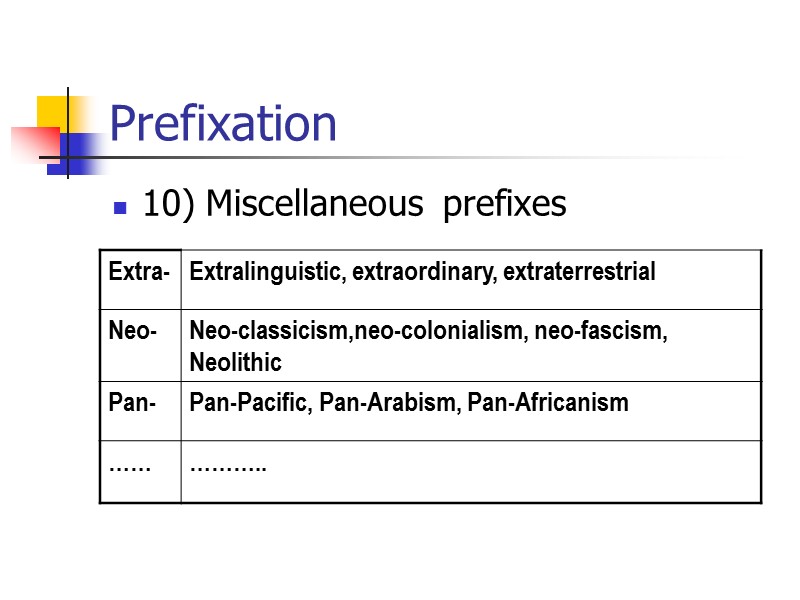
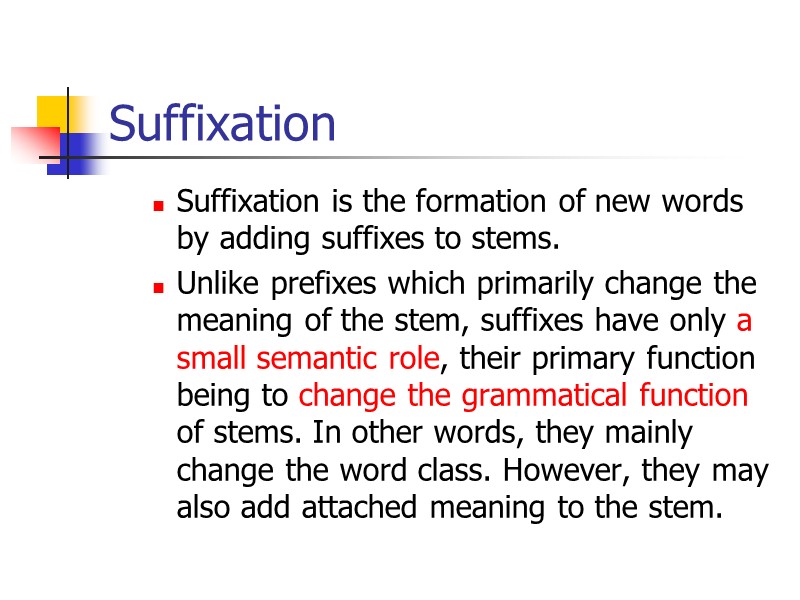
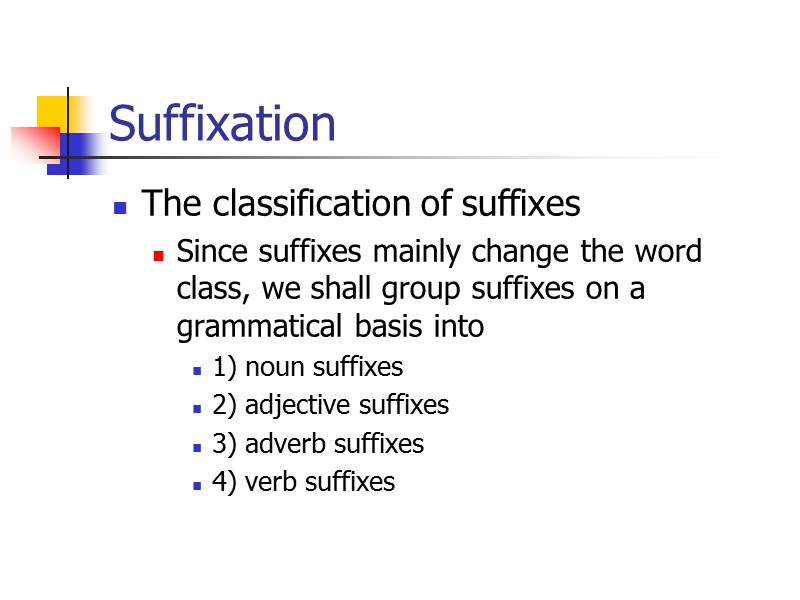
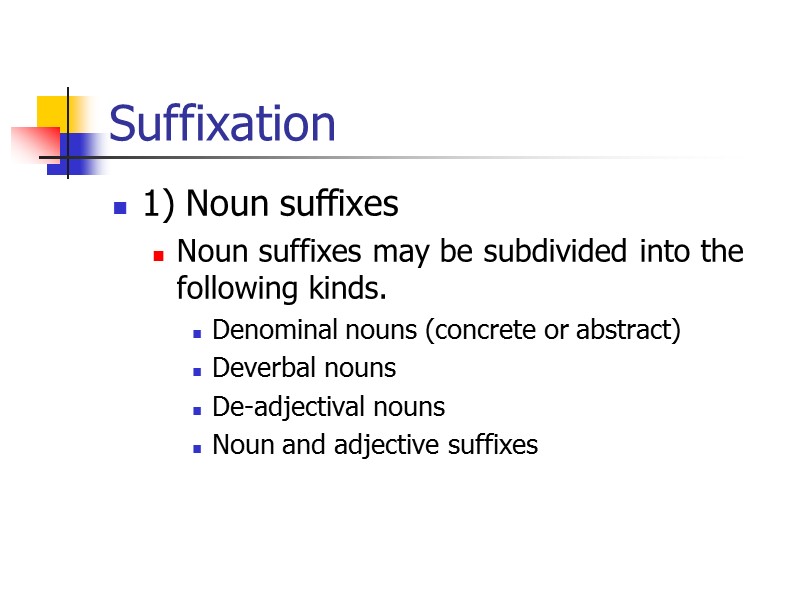
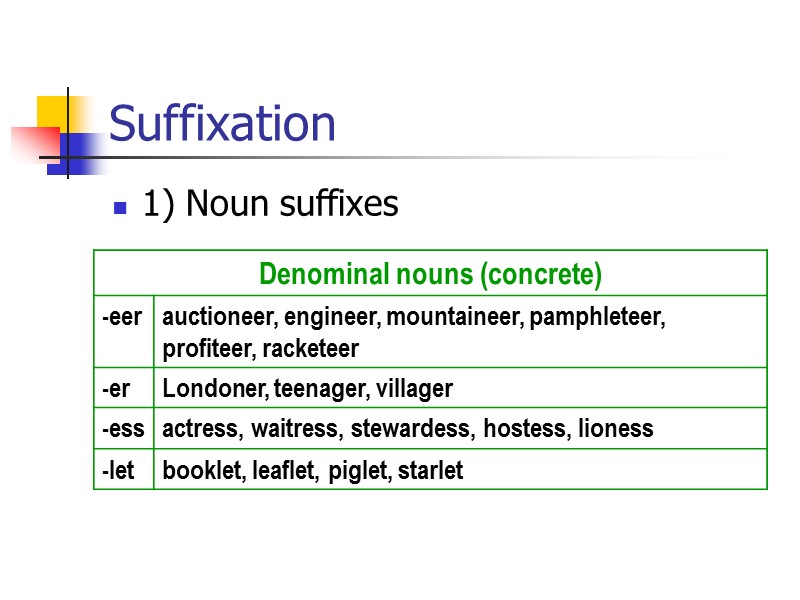
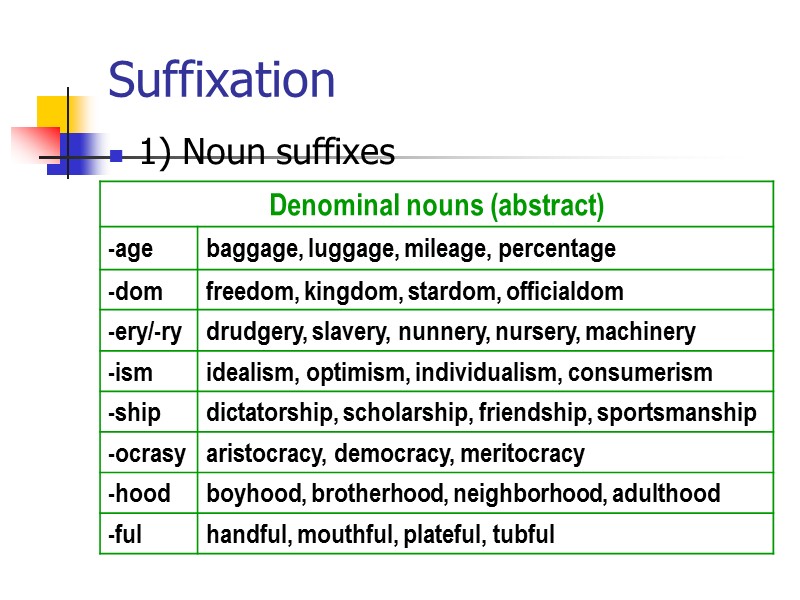
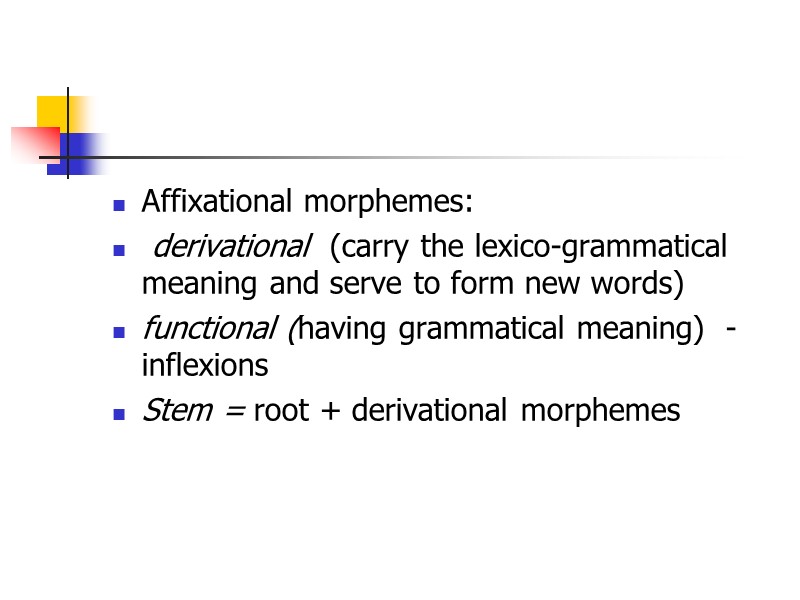
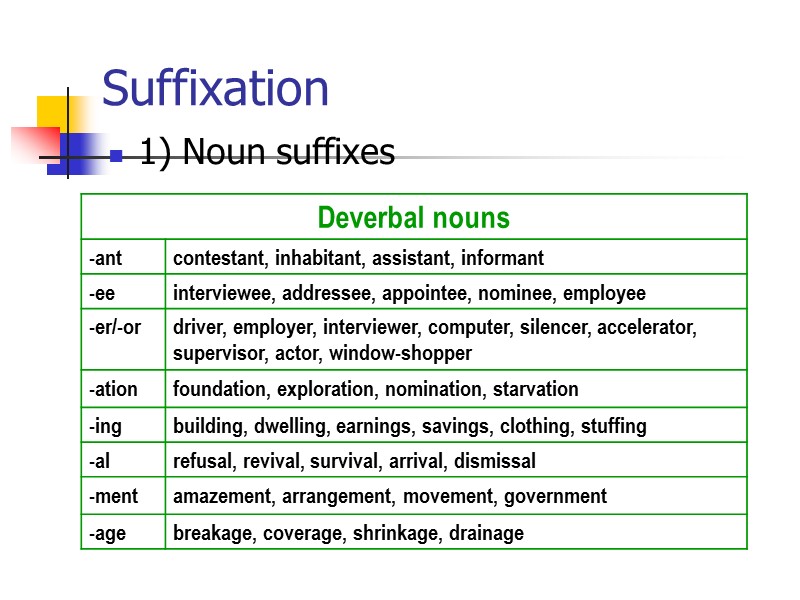
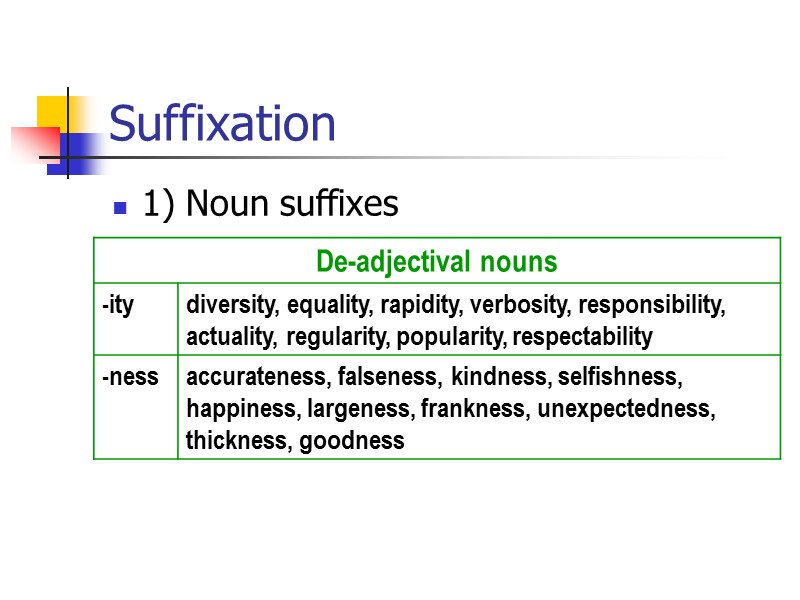
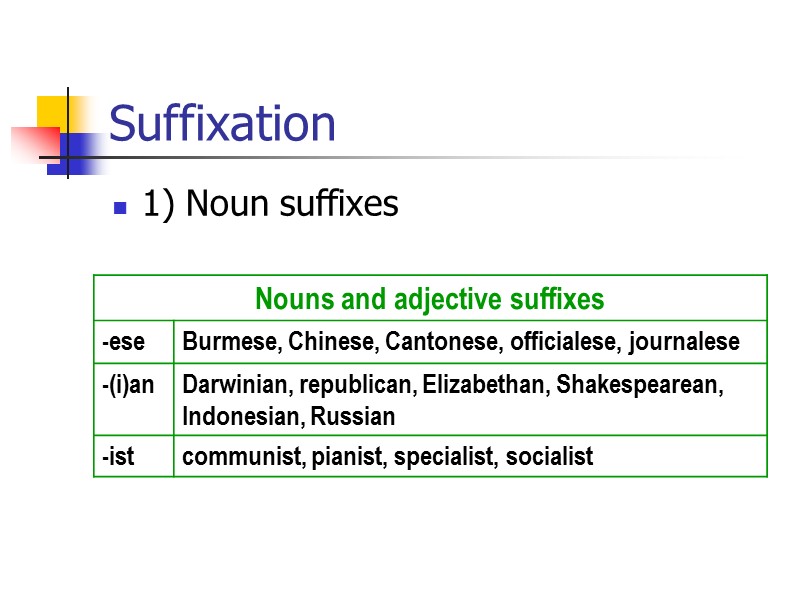

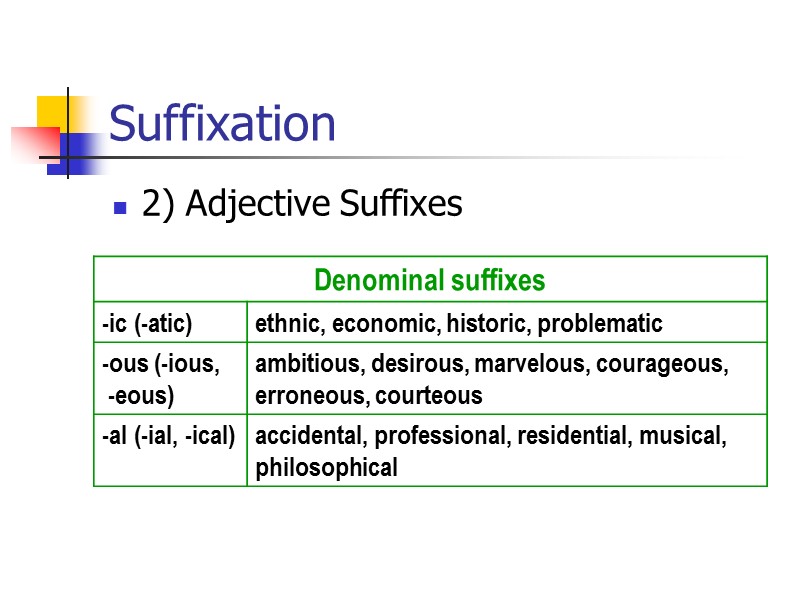
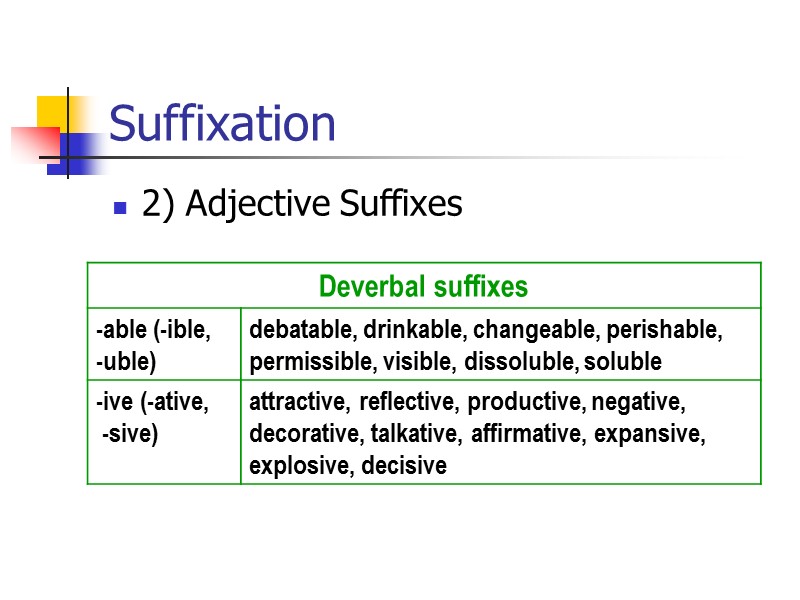
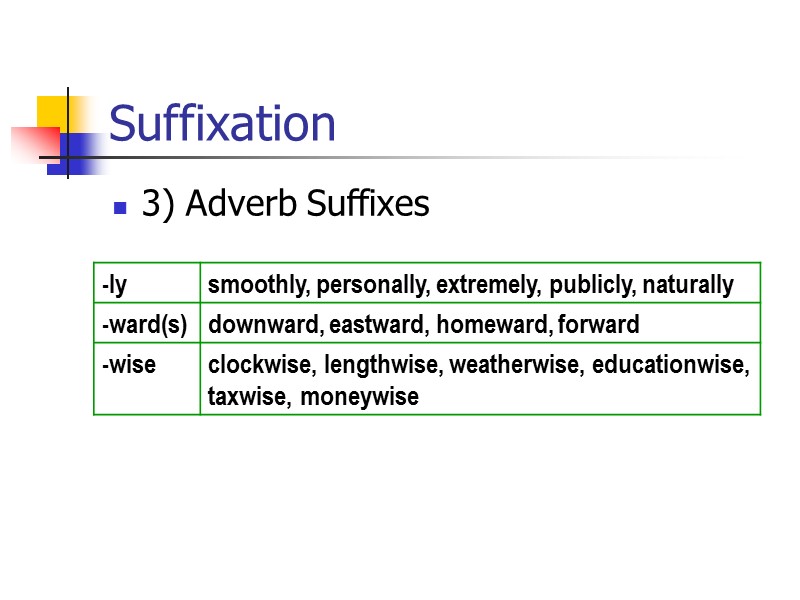
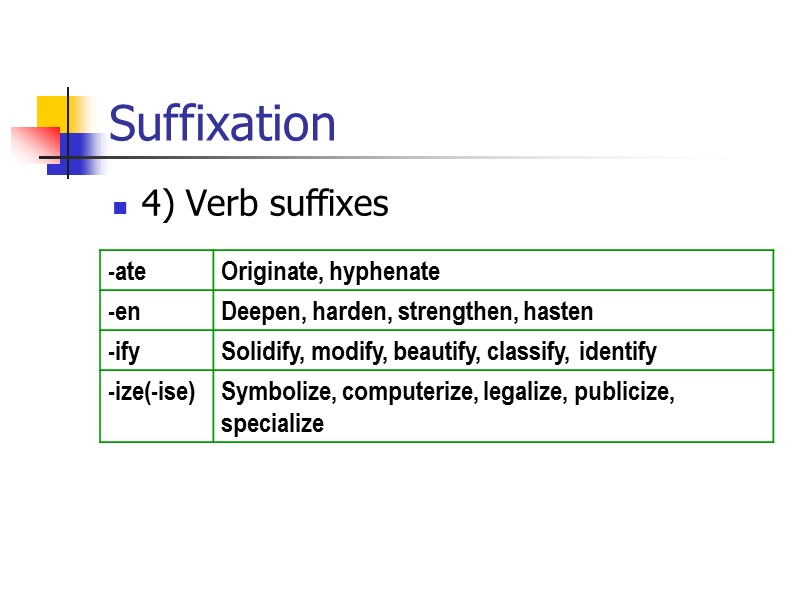
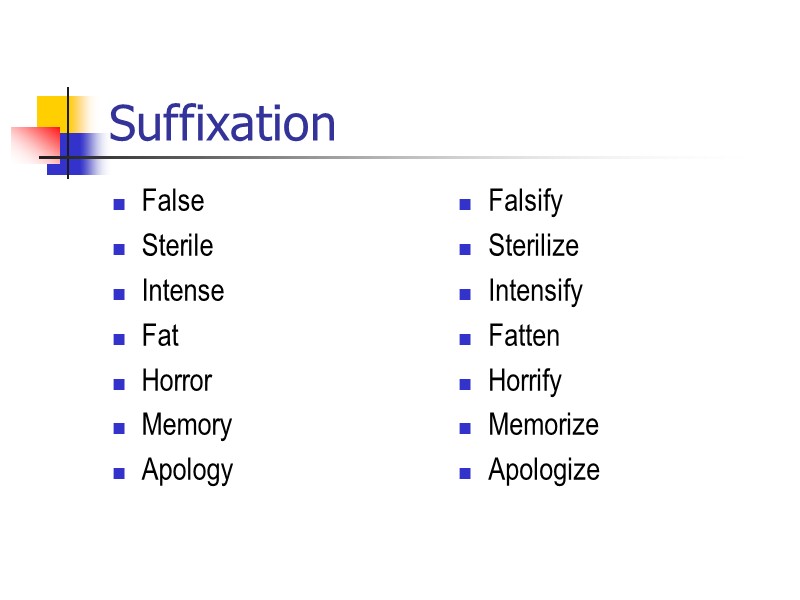
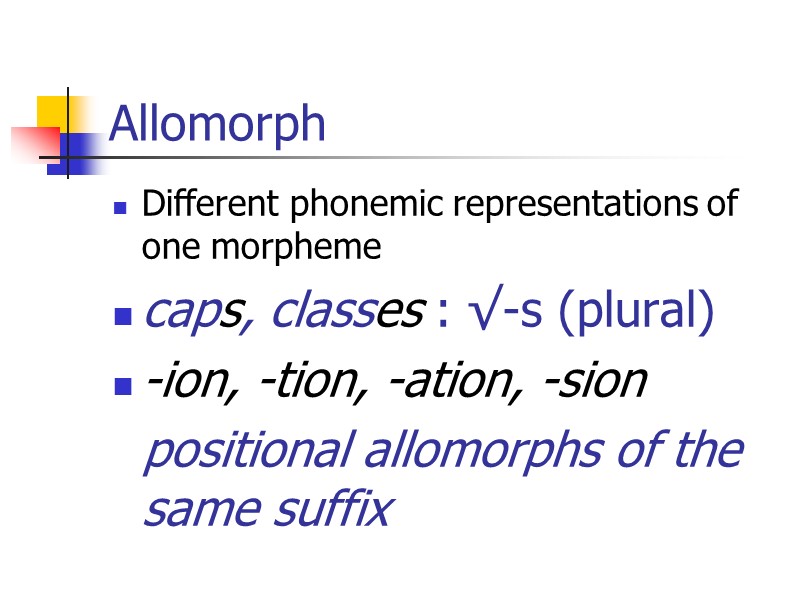
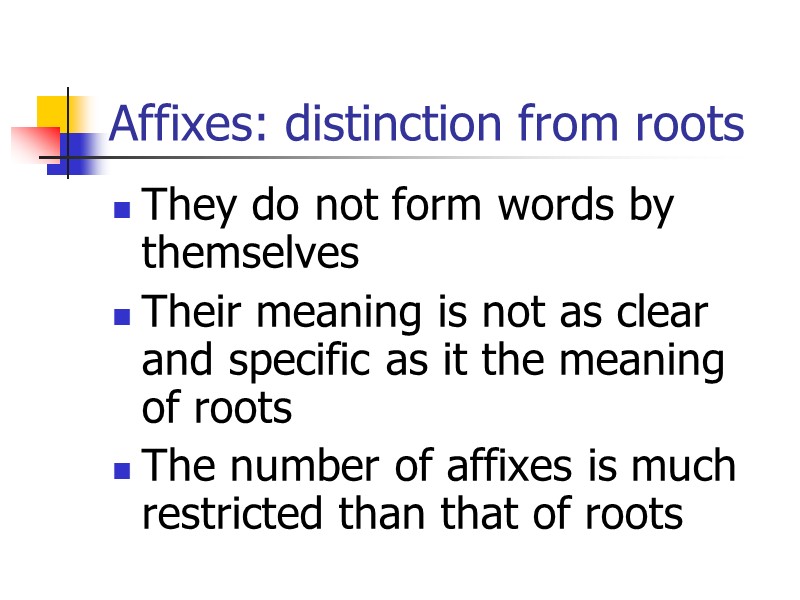
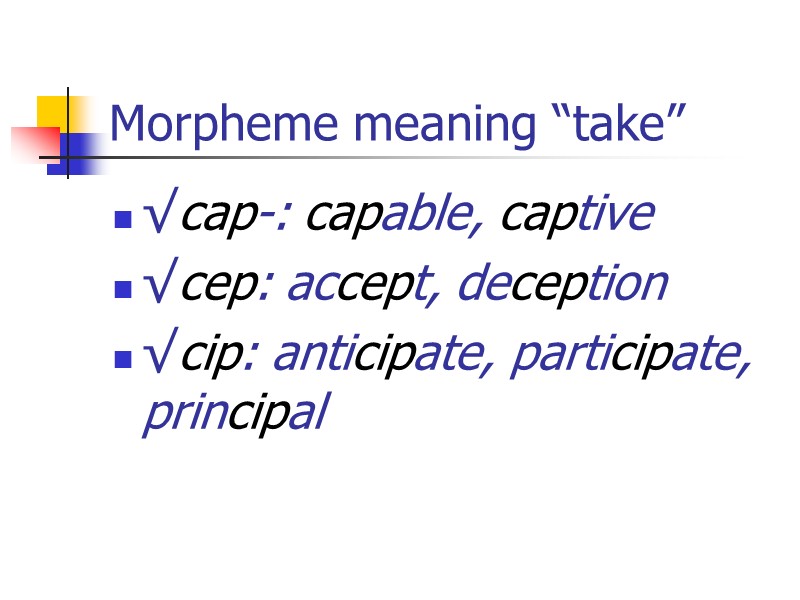
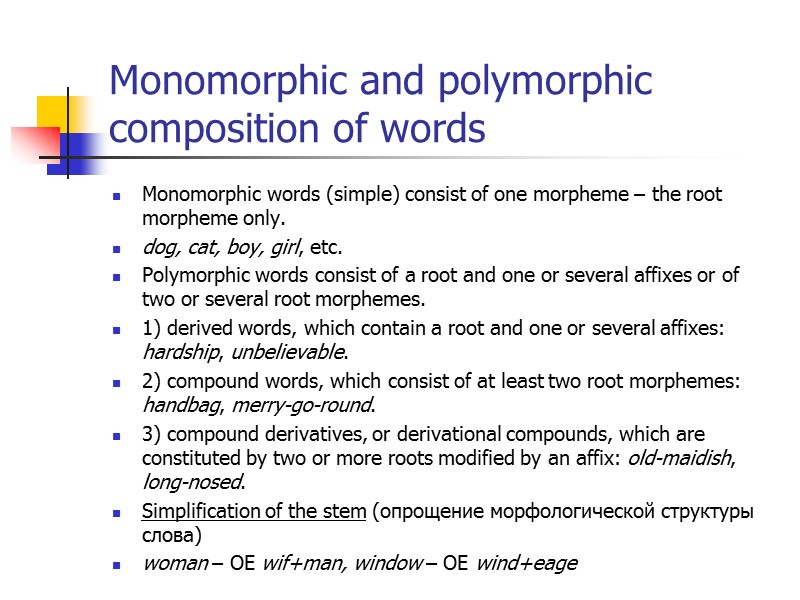
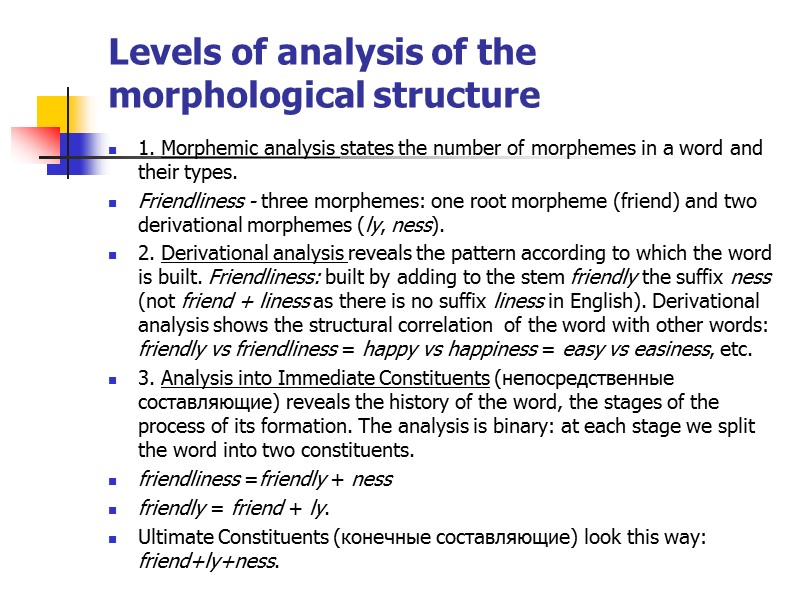
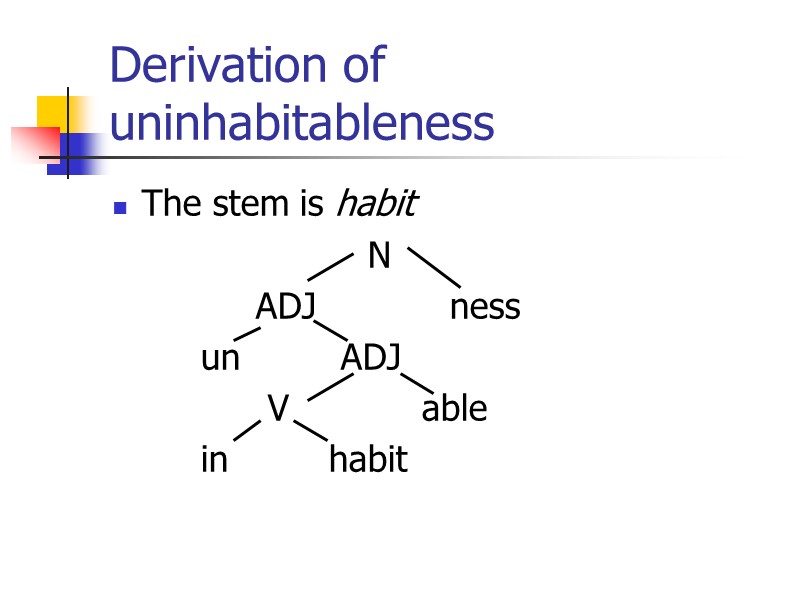
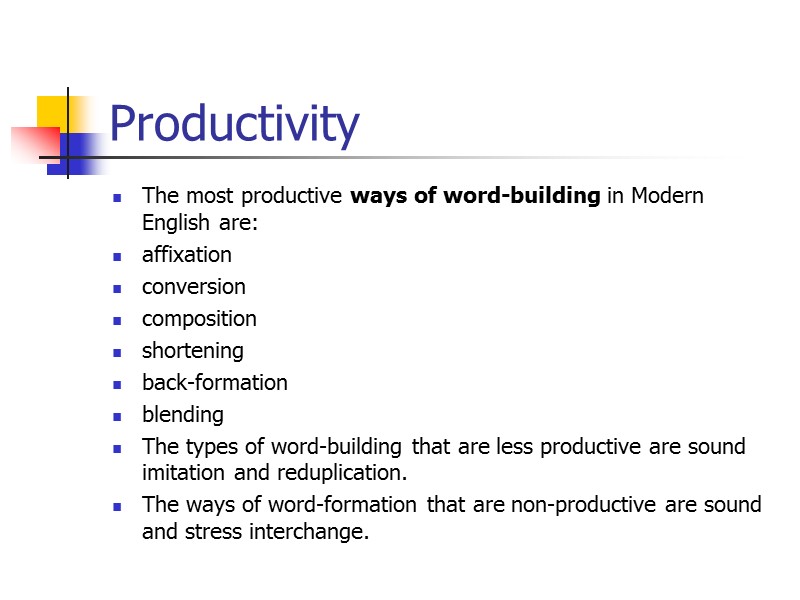
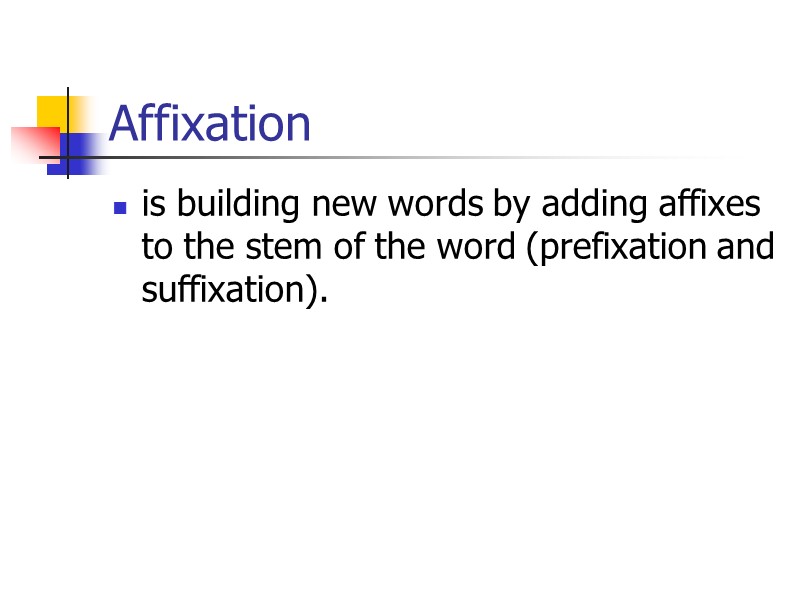
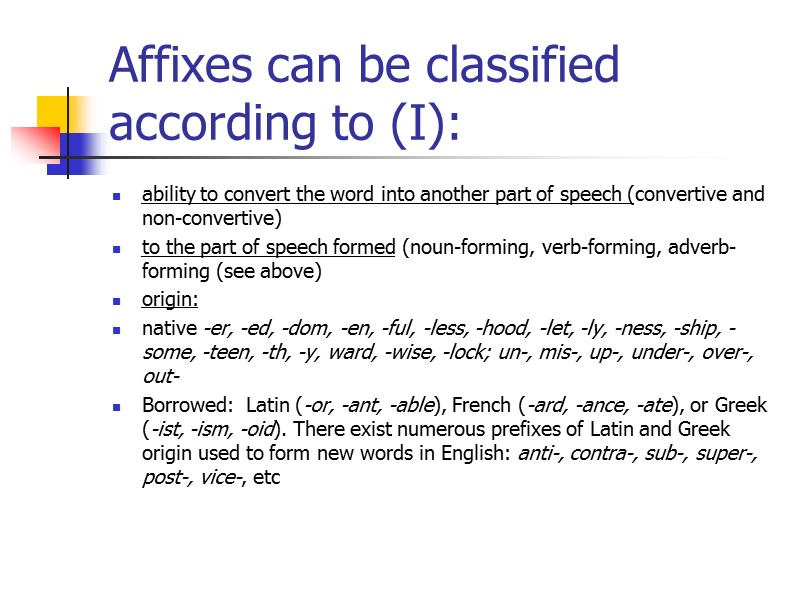
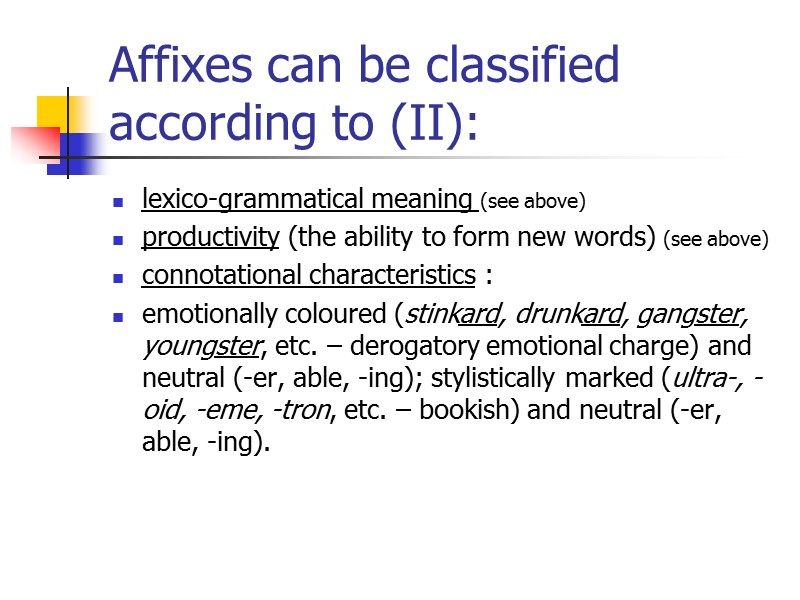
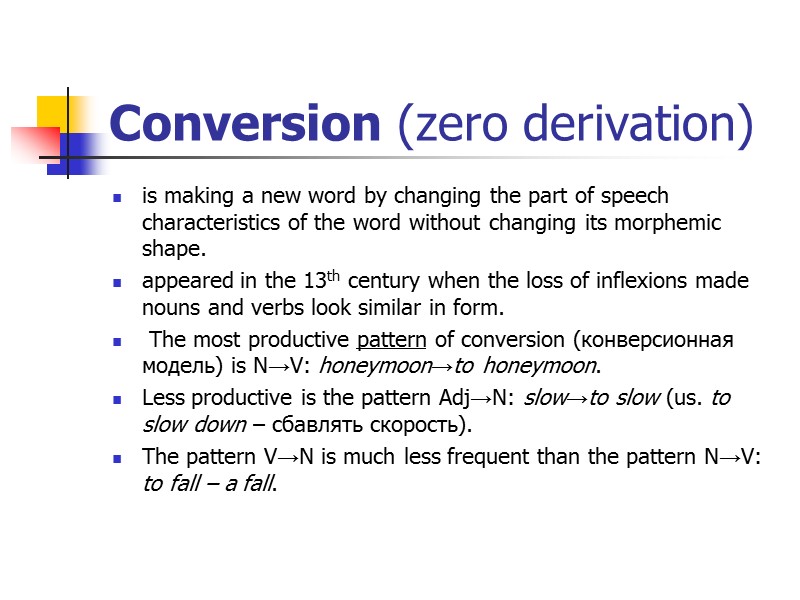
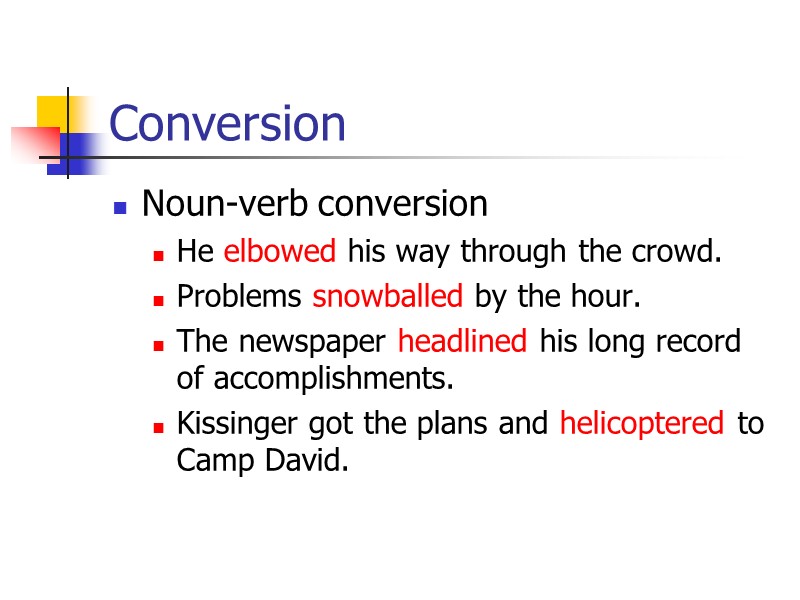
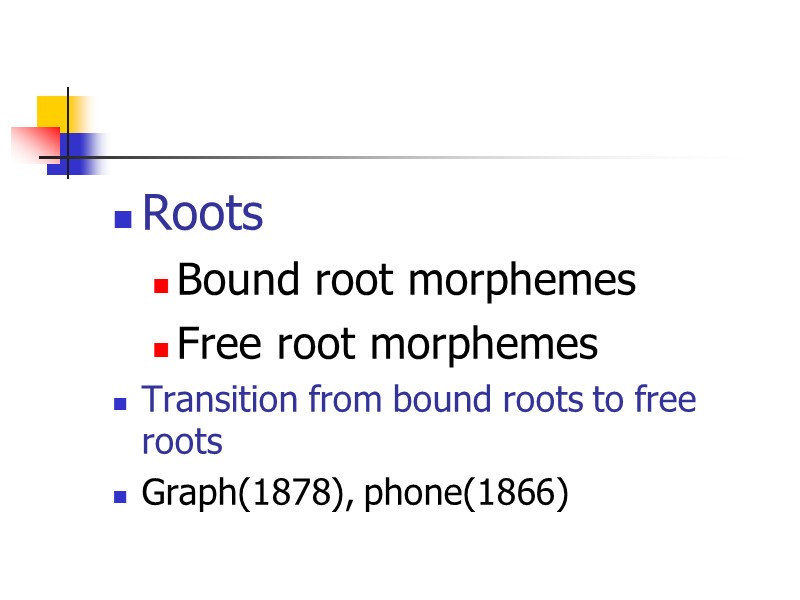
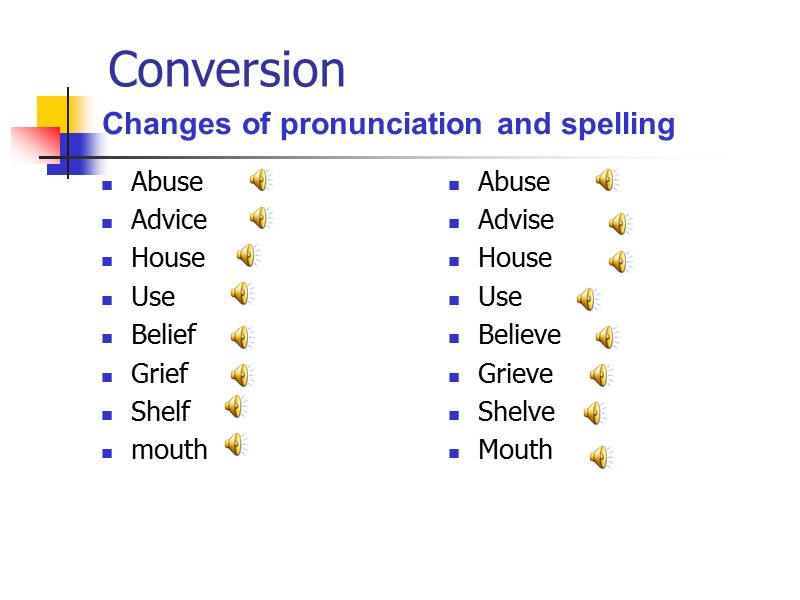
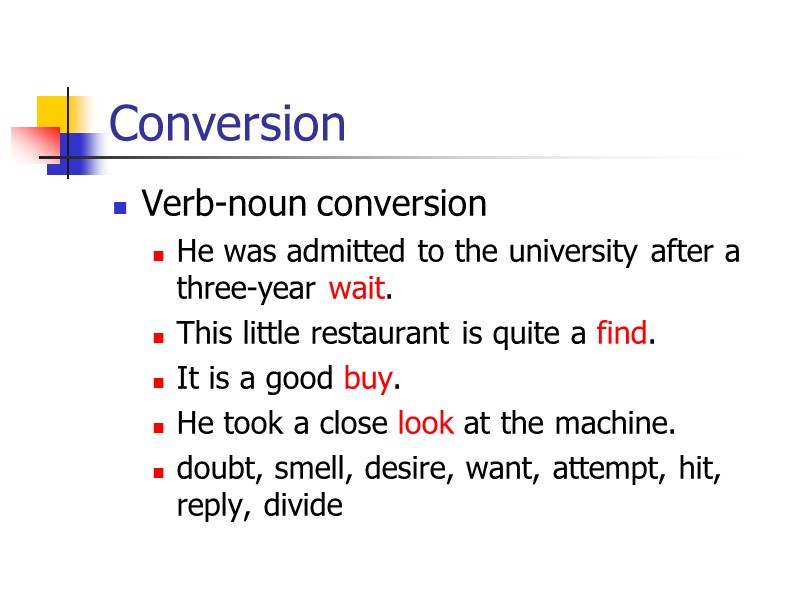
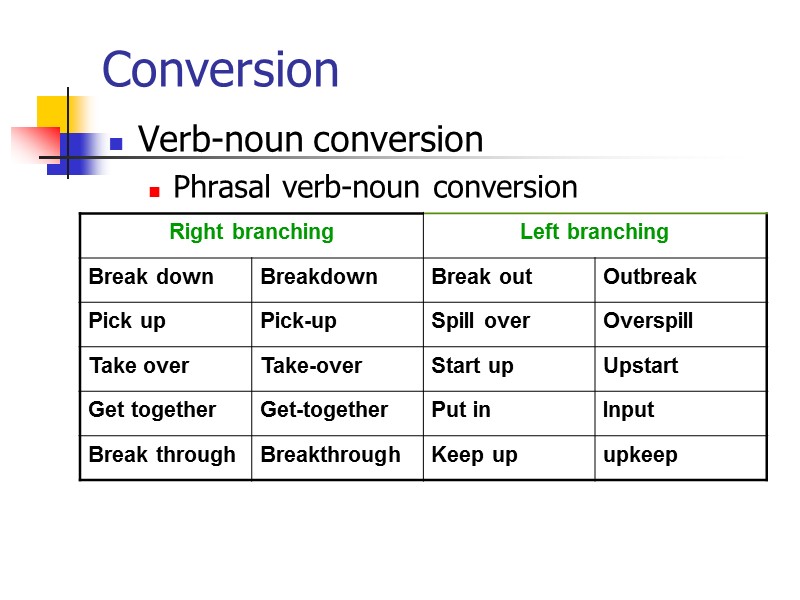
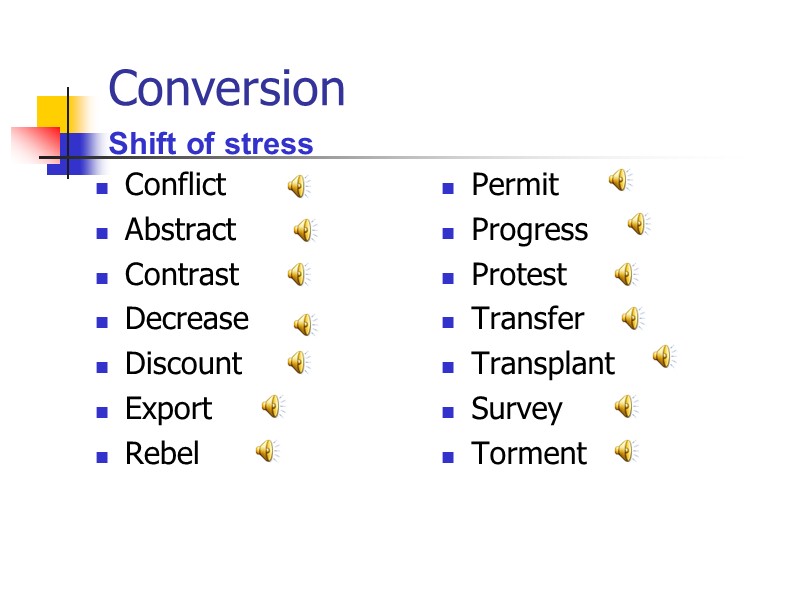
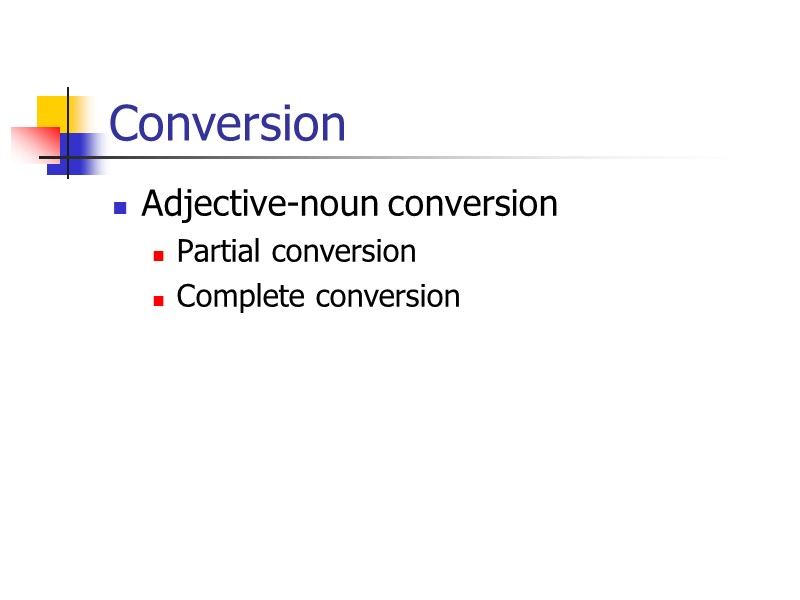
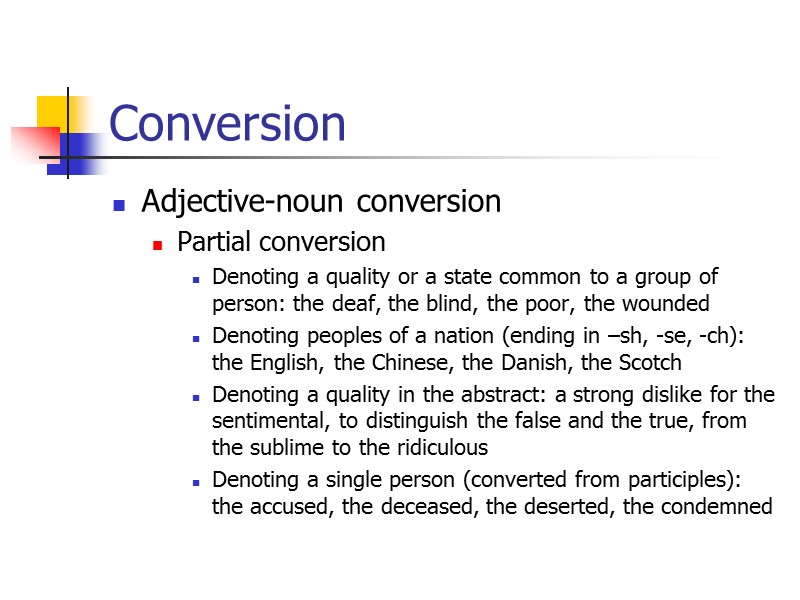
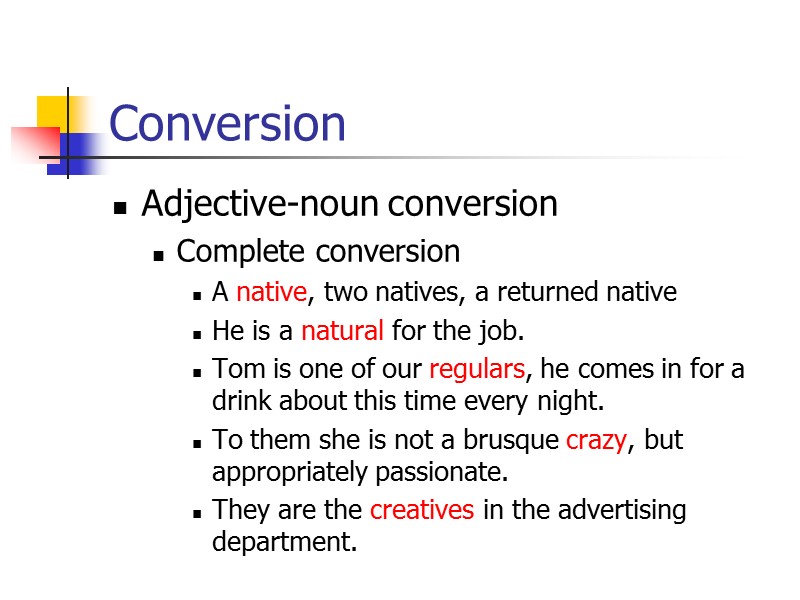
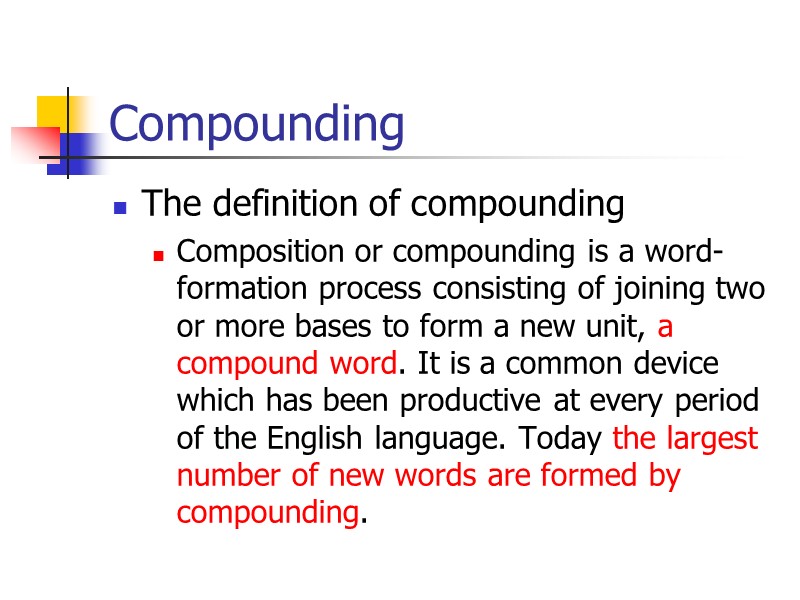
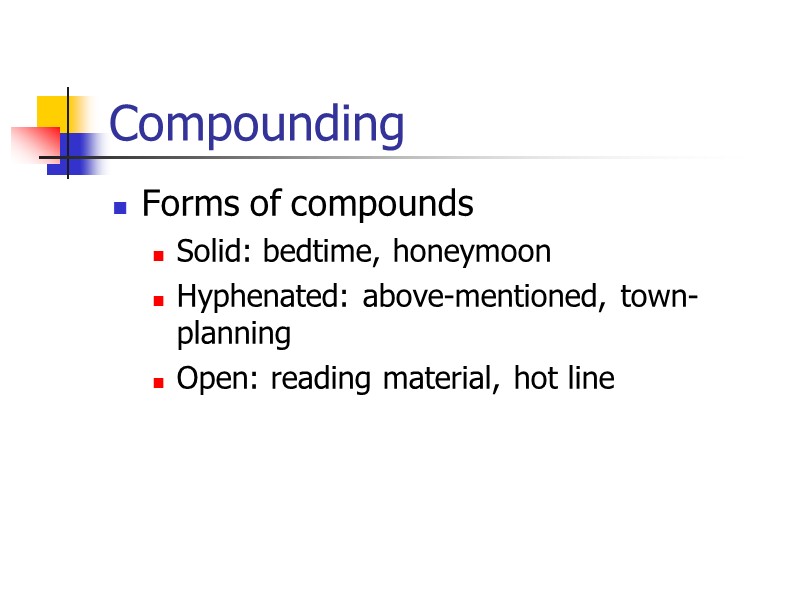
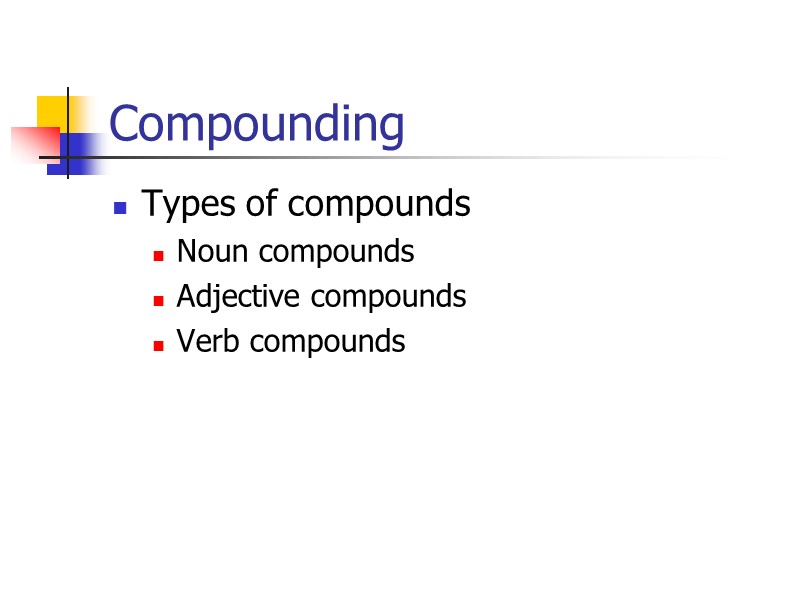
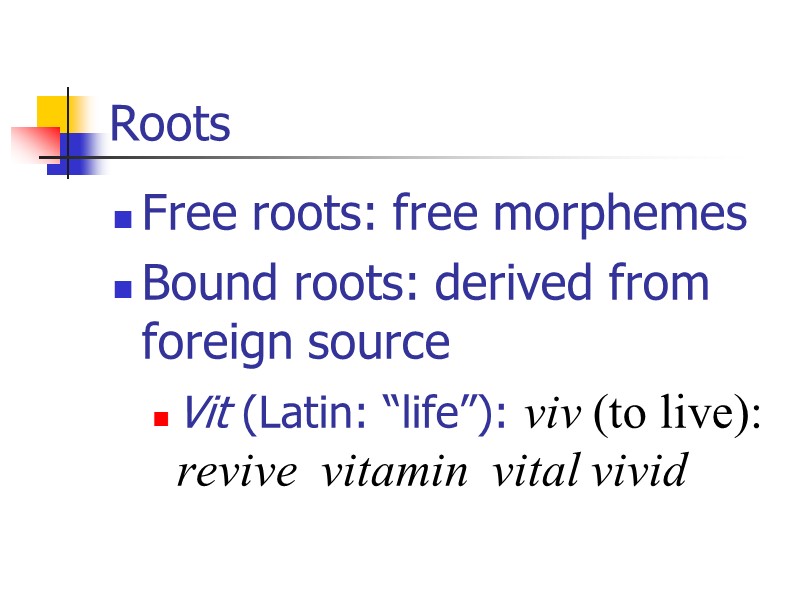
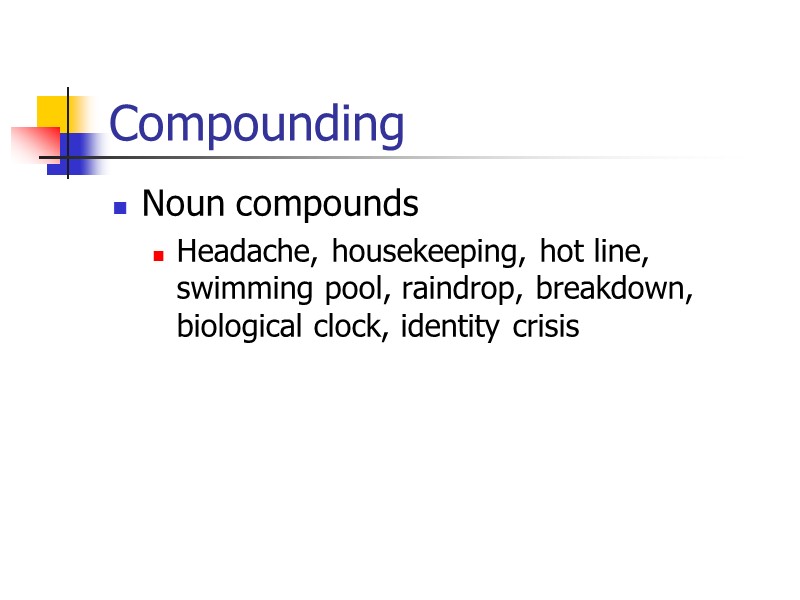
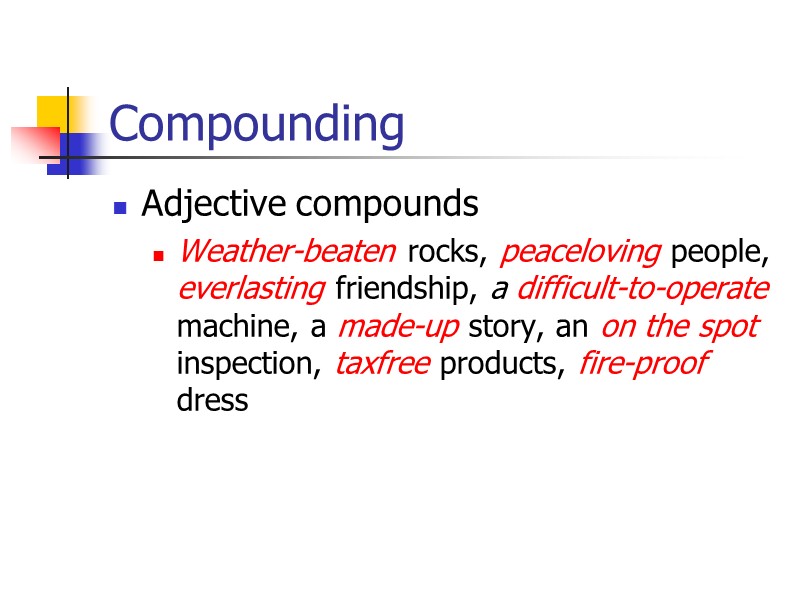
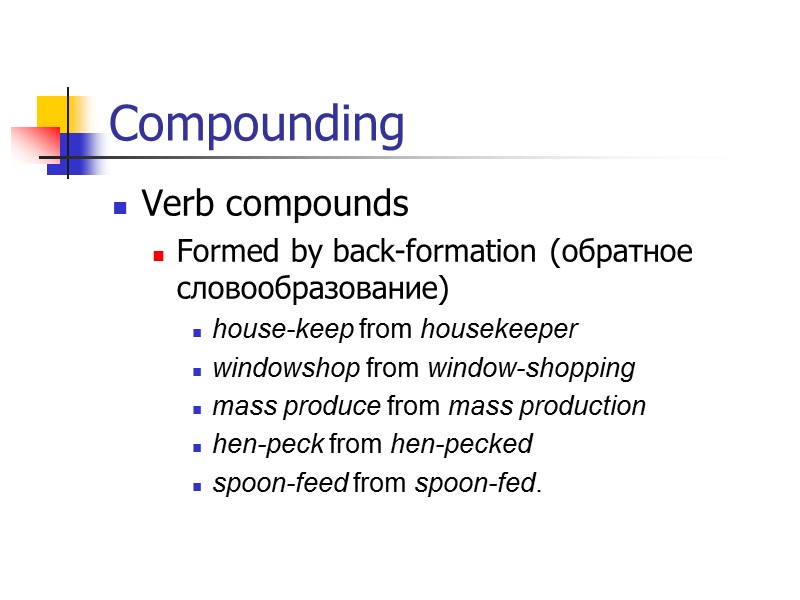
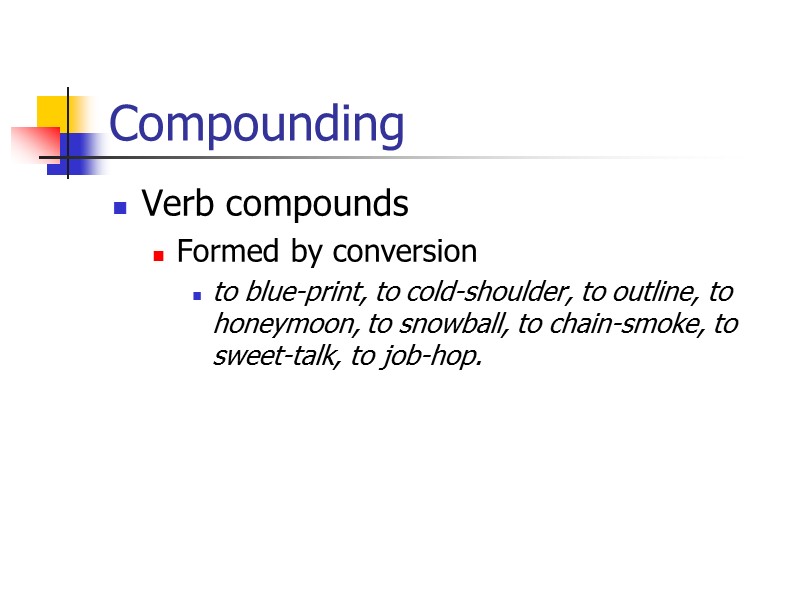
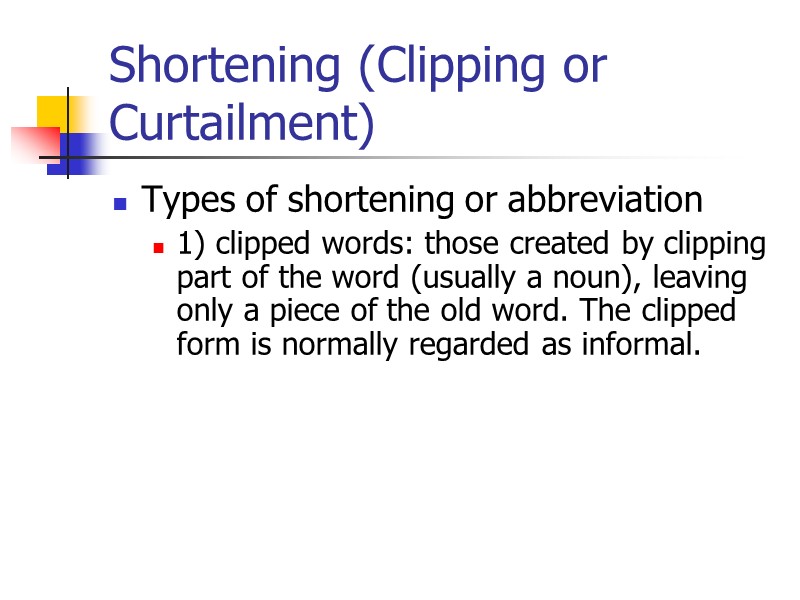
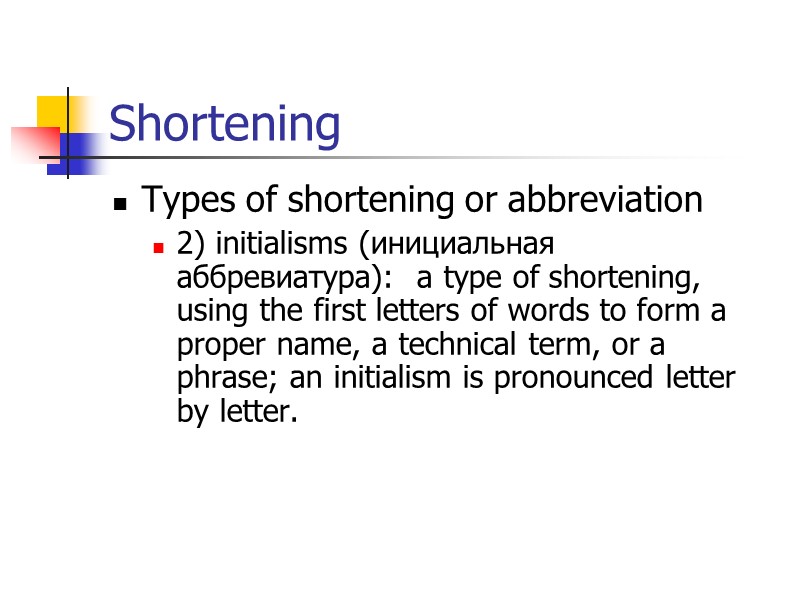
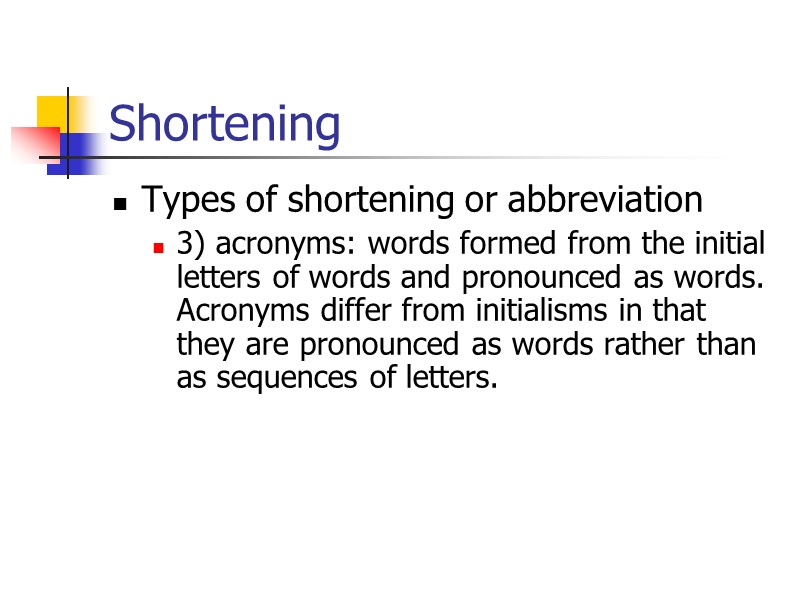
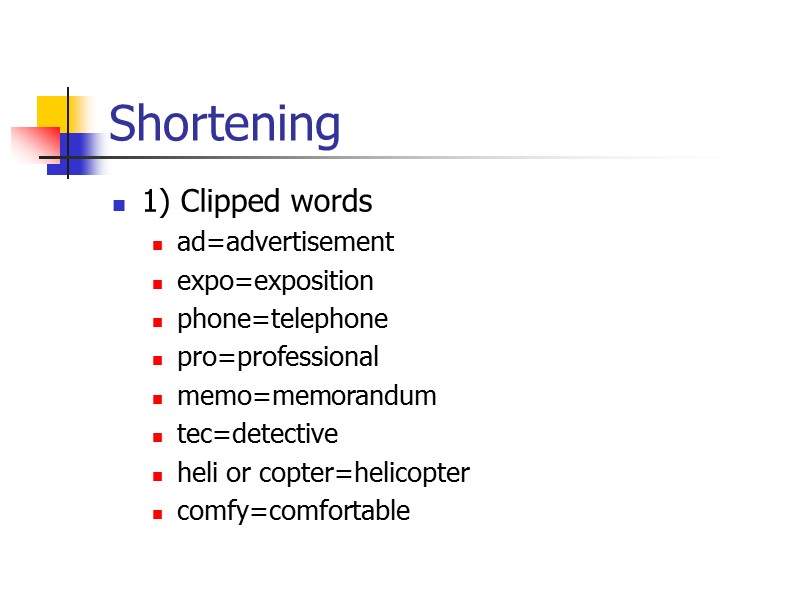
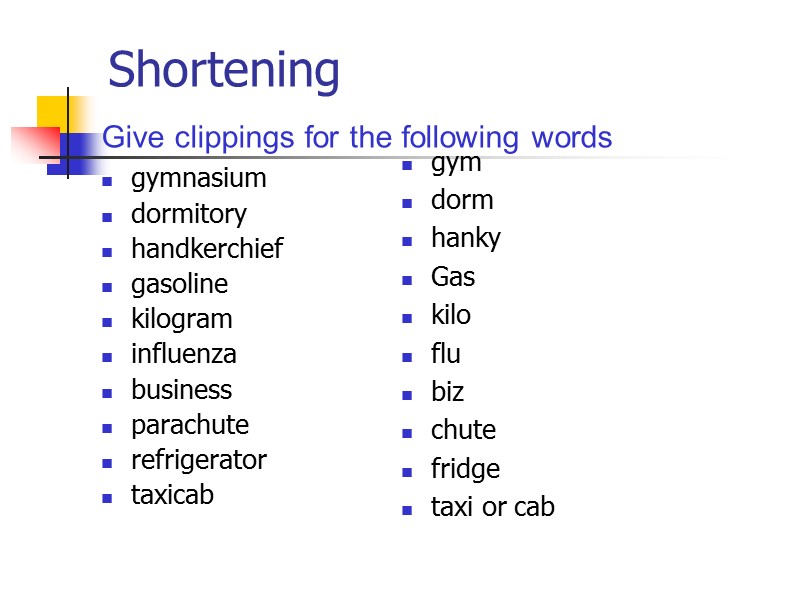
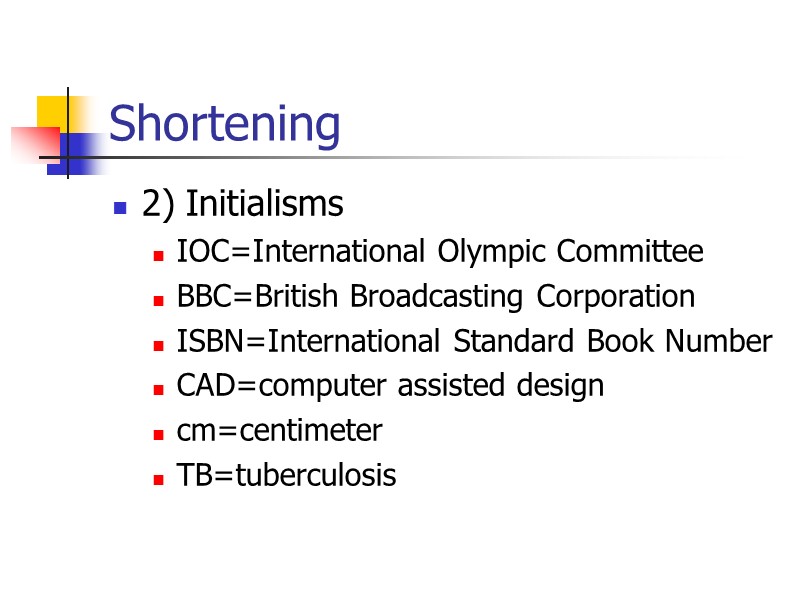
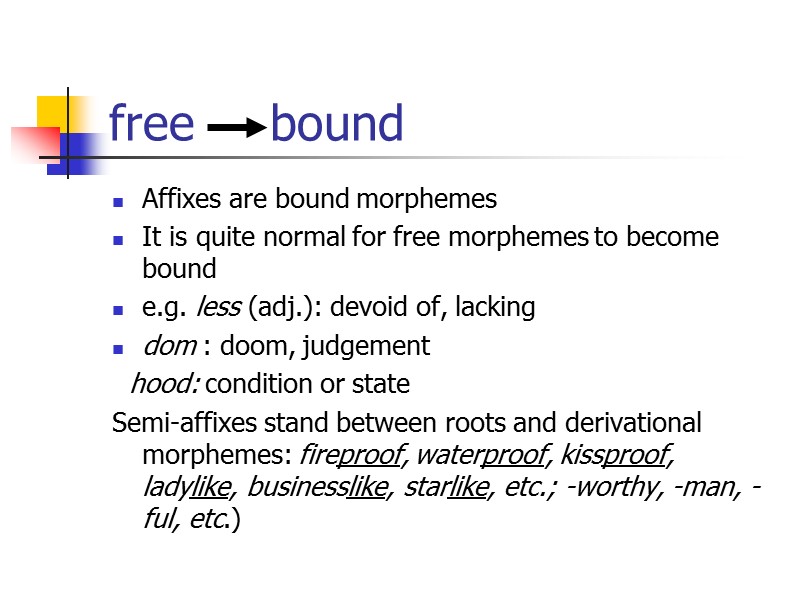
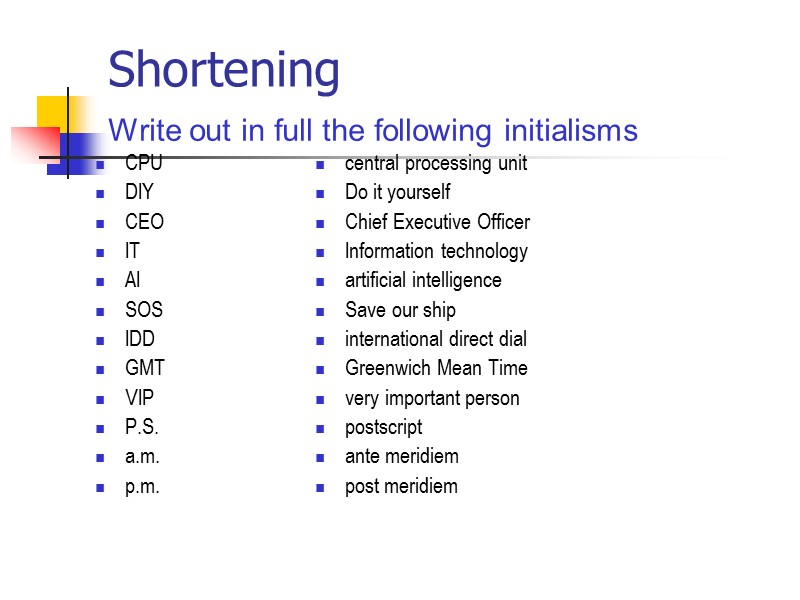
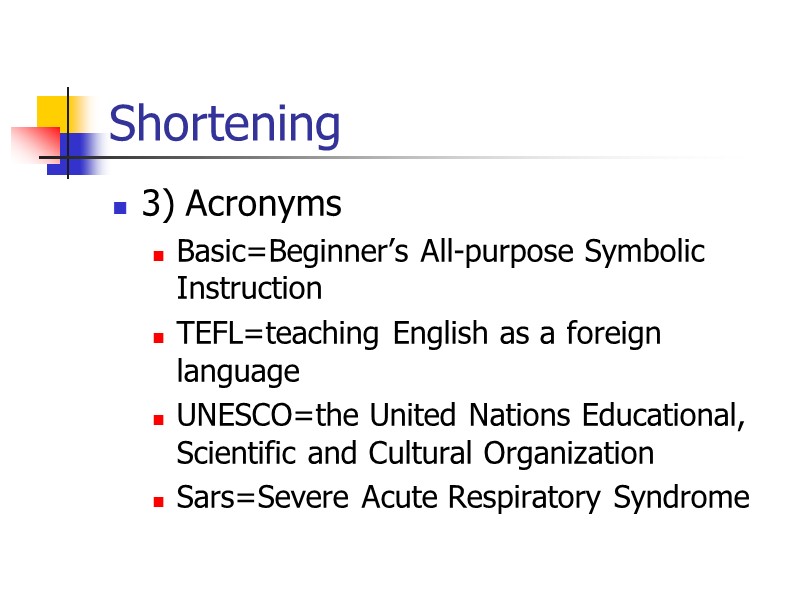
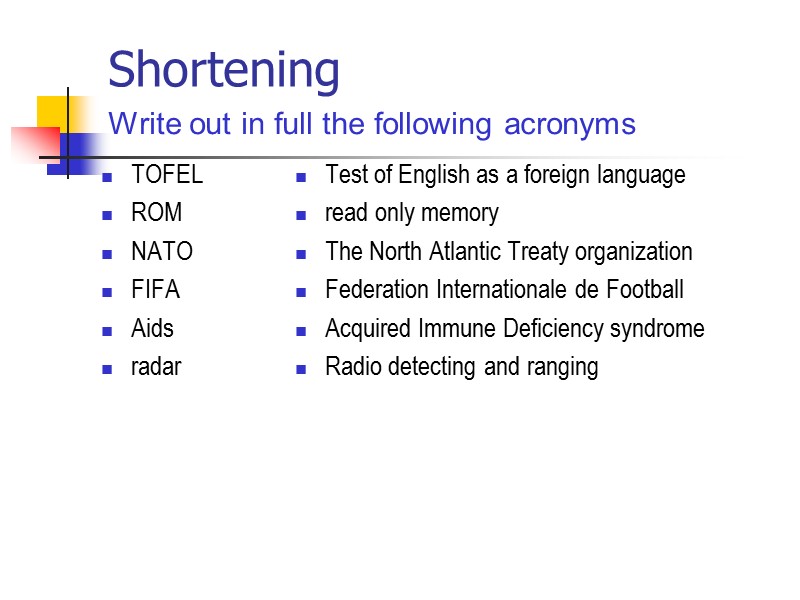
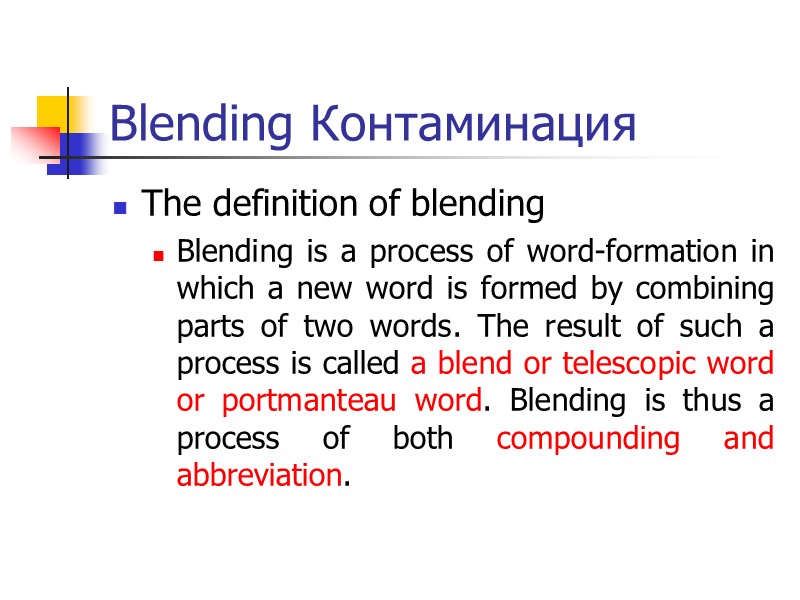
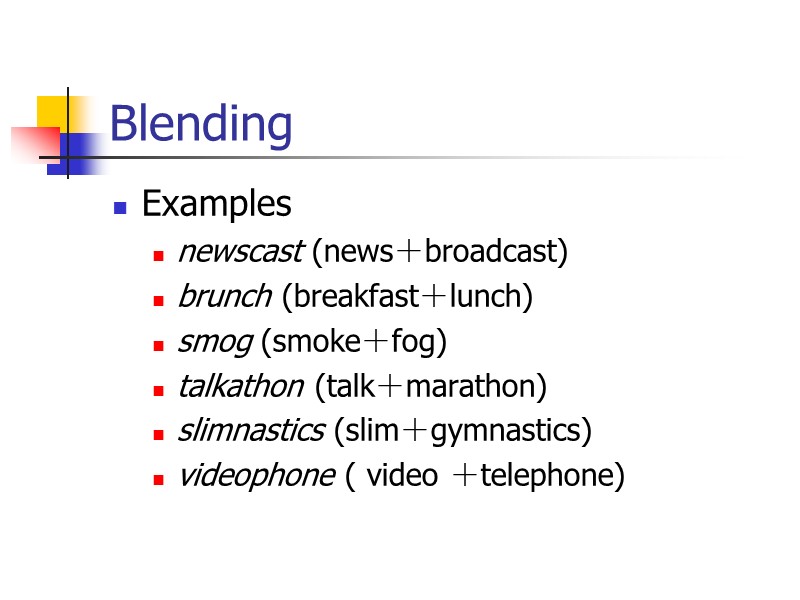
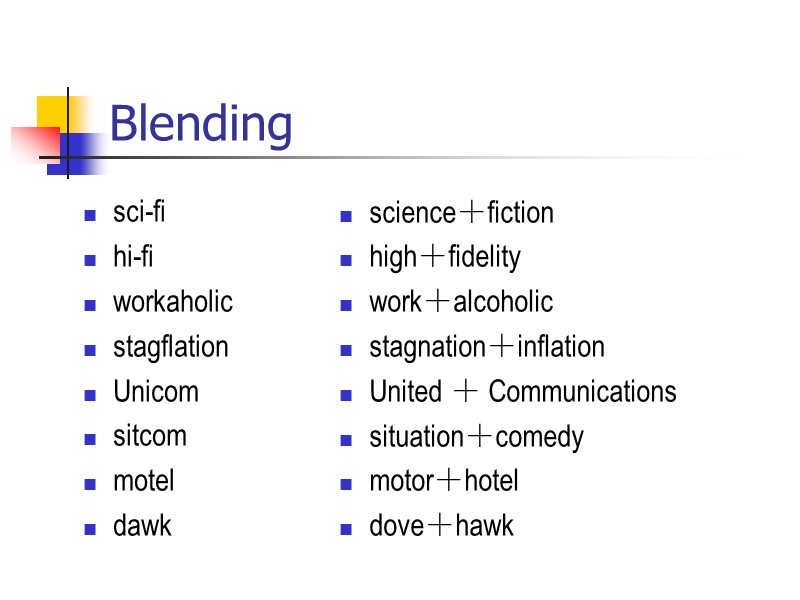
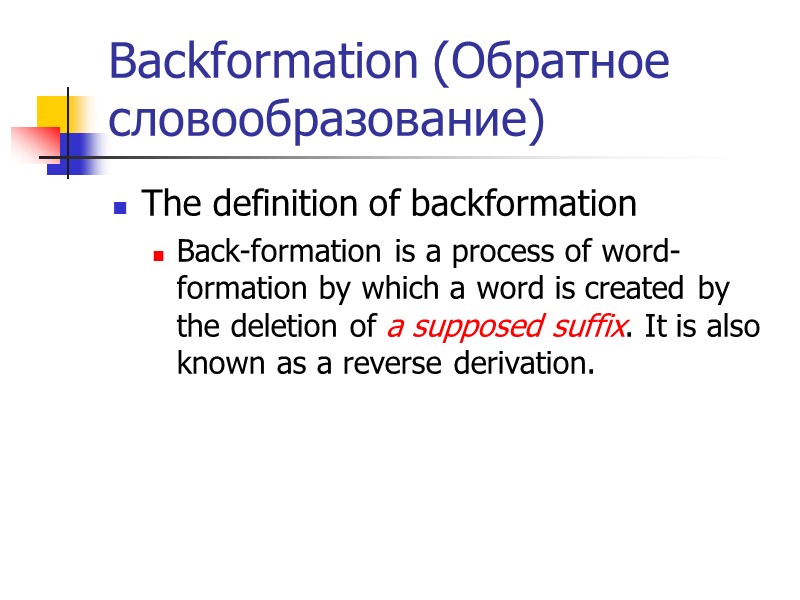
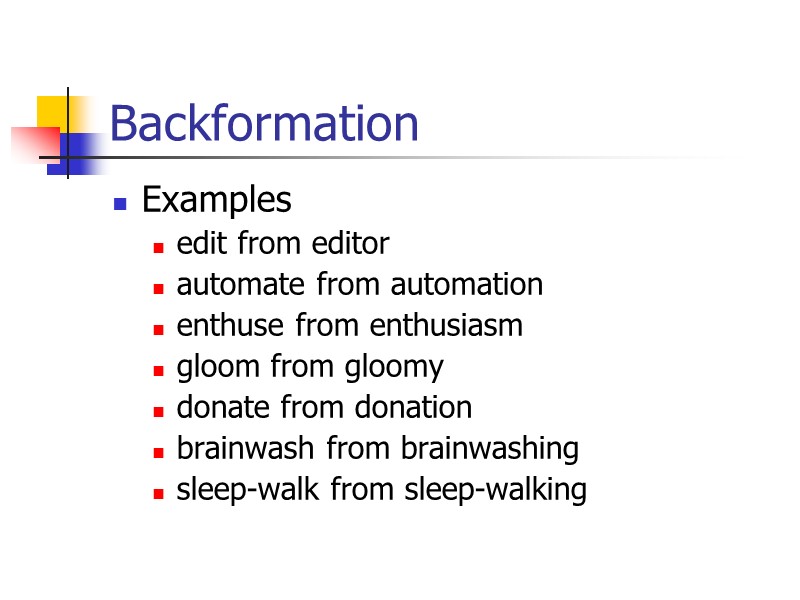
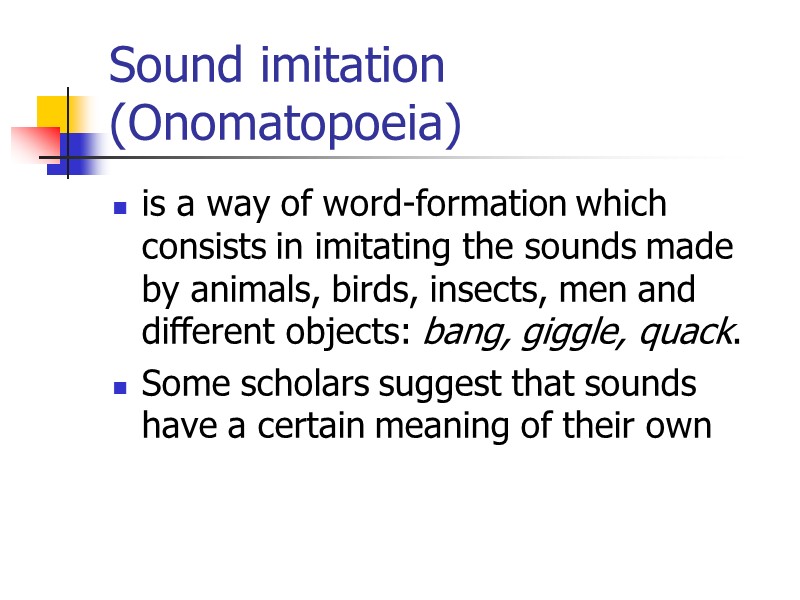
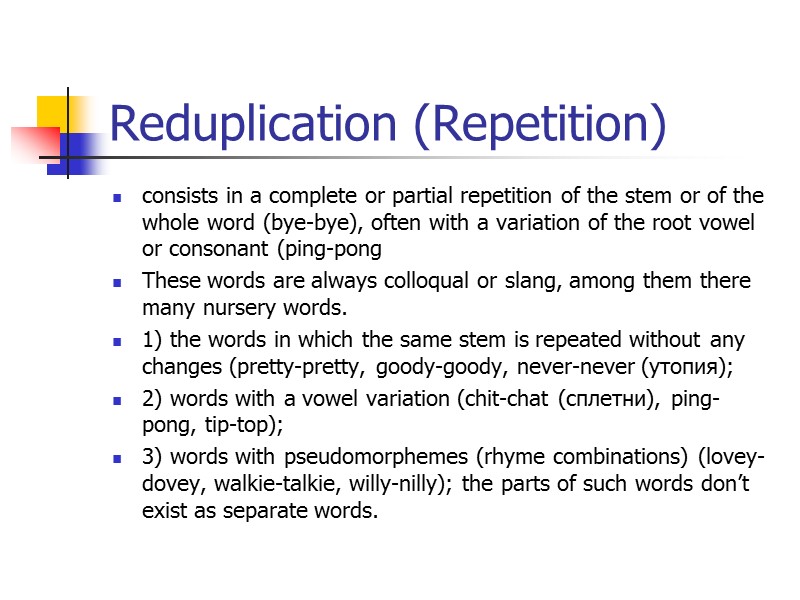
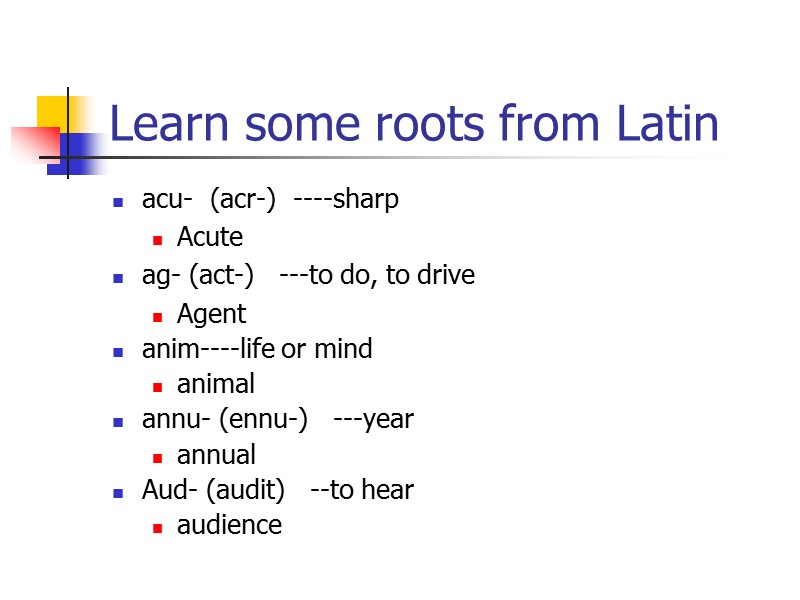
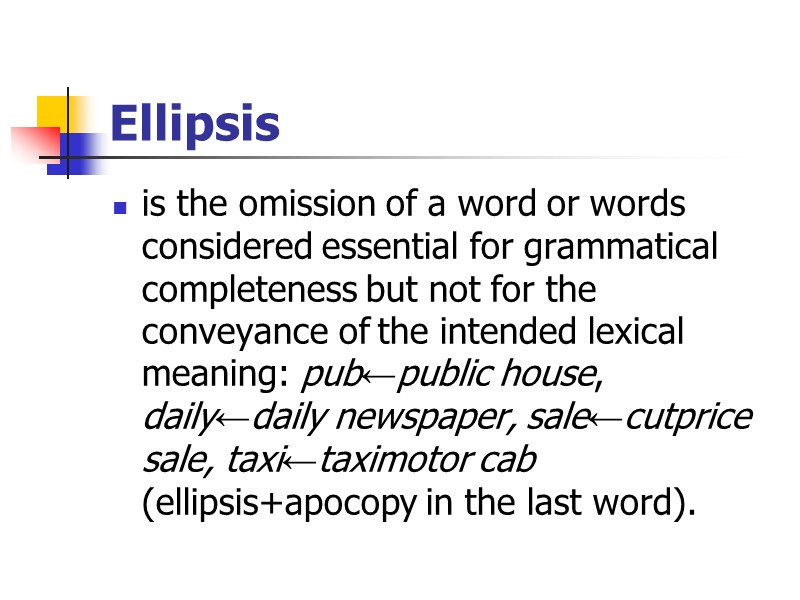
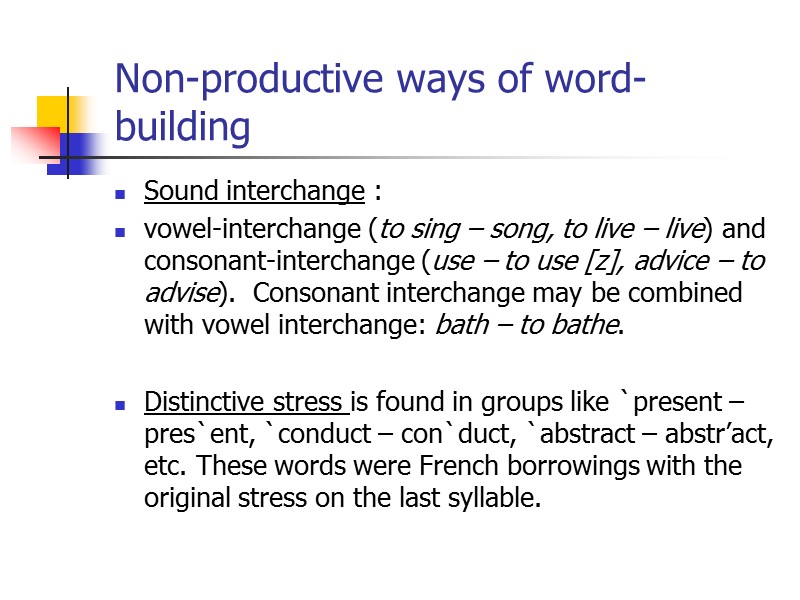
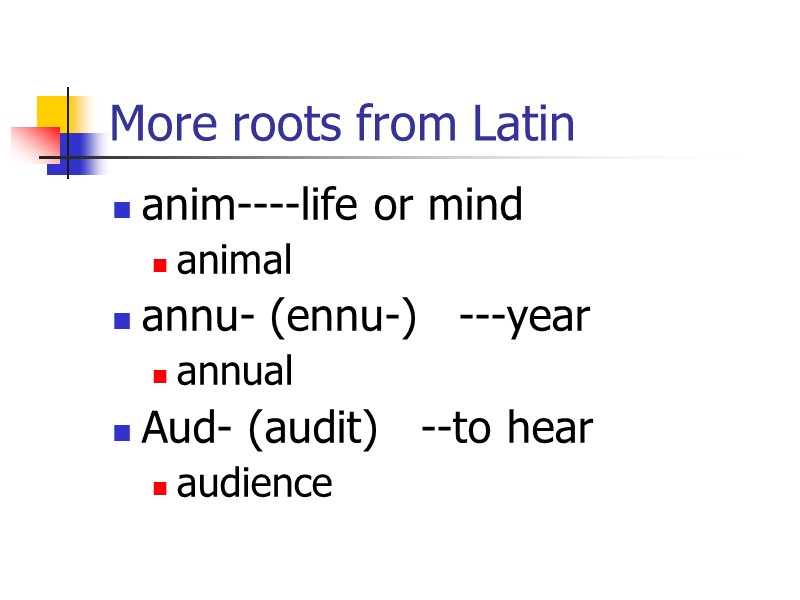
4-5_Lexicology_Word_Builidng.ppt
- Количество слайдов: 81
 Lecture 4-5. The Morphological Structure of English Words and Word-building in English Morphemes: the smallest meaningful linguistic unit of language, not divisible or analyzable into smaller forms. Roots Affixes: prefixes suffixes infixes (Ex.: stand)
Lecture 4-5. The Morphological Structure of English Words and Word-building in English Morphemes: the smallest meaningful linguistic unit of language, not divisible or analyzable into smaller forms. Roots Affixes: prefixes suffixes infixes (Ex.: stand)
 The Properties of Morphemes Smallest unit associated with a meaning car, care, carpet, cargo √car, √care, √carpet, √cargo
The Properties of Morphemes Smallest unit associated with a meaning car, care, carpet, cargo √car, √care, √carpet, √cargo
 Affixational morphemes: derivational (carry the lexico-grammatical meaning and serve to form new words) functional (having grammatical meaning) - inflexions Stem = root + derivational morphemes
Affixational morphemes: derivational (carry the lexico-grammatical meaning and serve to form new words) functional (having grammatical meaning) - inflexions Stem = root + derivational morphemes
 Affixes: distinction from roots They do not form words by themselves Their meaning is not as clear and specific as it the meaning of roots The number of affixes is much restricted than that of roots
Affixes: distinction from roots They do not form words by themselves Their meaning is not as clear and specific as it the meaning of roots The number of affixes is much restricted than that of roots
 Roots Bound root morphemes Free root morphemes Transition from bound roots to free roots Graph(1878), phone(1866)
Roots Bound root morphemes Free root morphemes Transition from bound roots to free roots Graph(1878), phone(1866)
 Roots Free roots: free morphemes Bound roots: derived from foreign source Vit (Latin: “life”): viv (to live): revive vitamin vital vivid
Roots Free roots: free morphemes Bound roots: derived from foreign source Vit (Latin: “life”): viv (to live): revive vitamin vital vivid
 free bound Affixes are bound morphemes It is quite normal for free morphemes to become bound e.g. less (adj.): devoid of, lacking dom : doom, judgement hood: condition or state Semi-affixes stand between roots and derivational morphemes: fireproof, waterproof, kissproof, ladylike, businesslike, starlike, etc.; -worthy, -man, -ful, etc.)
free bound Affixes are bound morphemes It is quite normal for free morphemes to become bound e.g. less (adj.): devoid of, lacking dom : doom, judgement hood: condition or state Semi-affixes stand between roots and derivational morphemes: fireproof, waterproof, kissproof, ladylike, businesslike, starlike, etc.; -worthy, -man, -ful, etc.)
 Learn some roots from Latin acu- (acr-) ----sharp Acute ag- (act-) ---to do, to drive Agent anim----life or mind animal annu- (ennu-) ---year annual Aud- (audit) --to hear audience
Learn some roots from Latin acu- (acr-) ----sharp Acute ag- (act-) ---to do, to drive Agent anim----life or mind animal annu- (ennu-) ---year annual Aud- (audit) --to hear audience
 More roots from Latin anim----life or mind animal annu- (ennu-) ---year annual Aud- (audit) --to hear audience
More roots from Latin anim----life or mind animal annu- (ennu-) ---year annual Aud- (audit) --to hear audience
 1) Negative prefixes
1) Negative prefixes
 Prefixation Order Literate Symmetry Governmental Relevant Productive Believable Vulnerable Sane Related Aligned Mature Disorder Illiterate Asymmetry Nongovernmental Irrelevant Unproductive Unbelievable Invulnerable Insane Unrelated Nonaligned Immature
Prefixation Order Literate Symmetry Governmental Relevant Productive Believable Vulnerable Sane Related Aligned Mature Disorder Illiterate Asymmetry Nongovernmental Irrelevant Unproductive Unbelievable Invulnerable Insane Unrelated Nonaligned Immature
 Prefixation 2) Reversative or privative
Prefixation 2) Reversative or privative
 Prefixation Centralize Plane Infect Zip Regulate Possess Pollute Decentralize Deplane Disinfect Unzip Deregulate Dispossess Depollute
Prefixation Centralize Plane Infect Zip Regulate Possess Pollute Decentralize Deplane Disinfect Unzip Deregulate Dispossess Depollute
 Prefixation 3) Pejorative prefixes
Prefixation 3) Pejorative prefixes
 Prefixation 4) Prefixes of degree or size
Prefixation 4) Prefixes of degree or size
 Prefixation Computer Critical Conscious Natural Sensitive Simple Number Statement culture Minicomputer Ultracritic /hypercritic Subconscious Supernatural Hypersensitive/ultrasensitive Oversimple Outnumber Understatement Subculture
Prefixation Computer Critical Conscious Natural Sensitive Simple Number Statement culture Minicomputer Ultracritic /hypercritic Subconscious Supernatural Hypersensitive/ultrasensitive Oversimple Outnumber Understatement Subculture
 Prefixation 5) Prefixes of orientation and attitude
Prefixation 5) Prefixes of orientation and attitude
 Prefixation 6) Locative prefixes
Prefixation 6) Locative prefixes
 Prefixation View Conference Continental Ground Cast Specific Racial Shore Interview teleconference Intercontinental Foreground Telecast Transpacific Transracial Foreshore
Prefixation View Conference Continental Ground Cast Specific Racial Shore Interview teleconference Intercontinental Foreground Telecast Transpacific Transracial Foreshore
 Prefixation 7) Prefixes of time and order
Prefixation 7) Prefixes of time and order
 Prefixation 8) Number prefixes
Prefixation 8) Number prefixes
 Prefixation Lingual Lateral Polar Dimensional Unilingual, bilingual, trilingual, multilingual Unilateral, bilateral, trilateral, multilateral Unipolar, bipolar, tripolar, multipolar Unidimensional, bidimensional, tridimensional (three-dimensional), multidimensional
Prefixation Lingual Lateral Polar Dimensional Unilingual, bilingual, trilingual, multilingual Unilateral, bilateral, trilateral, multilateral Unipolar, bipolar, tripolar, multipolar Unidimensional, bidimensional, tridimensional (three-dimensional), multidimensional
 Prefixation 9) Conversion prefixes
Prefixation 9) Conversion prefixes
 Prefixation 10) Miscellaneous prefixes
Prefixation 10) Miscellaneous prefixes
 Suffixation Suffixation is the formation of new words by adding suffixes to stems. Unlike prefixes which primarily change the meaning of the stem, suffixes have only a small semantic role, their primary function being to change the grammatical function of stems. In other words, they mainly change the word class. However, they may also add attached meaning to the stem.
Suffixation Suffixation is the formation of new words by adding suffixes to stems. Unlike prefixes which primarily change the meaning of the stem, suffixes have only a small semantic role, their primary function being to change the grammatical function of stems. In other words, they mainly change the word class. However, they may also add attached meaning to the stem.
 Suffixation The classification of suffixes Since suffixes mainly change the word class, we shall group suffixes on a grammatical basis into 1) noun suffixes 2) adjective suffixes 3) adverb suffixes 4) verb suffixes
Suffixation The classification of suffixes Since suffixes mainly change the word class, we shall group suffixes on a grammatical basis into 1) noun suffixes 2) adjective suffixes 3) adverb suffixes 4) verb suffixes
 Suffixation 1) Noun suffixes Noun suffixes may be subdivided into the following kinds. Denominal nouns (concrete or abstract) Deverbal nouns De-adjectival nouns Noun and adjective suffixes
Suffixation 1) Noun suffixes Noun suffixes may be subdivided into the following kinds. Denominal nouns (concrete or abstract) Deverbal nouns De-adjectival nouns Noun and adjective suffixes
 Suffixation 1) Noun suffixes
Suffixation 1) Noun suffixes
 Suffixation 1) Noun suffixes
Suffixation 1) Noun suffixes
 Suffixation 1) Noun suffixes
Suffixation 1) Noun suffixes
 Suffixation 1) Noun suffixes
Suffixation 1) Noun suffixes
 Suffixation 1) Noun suffixes
Suffixation 1) Noun suffixes
 Suffixation 2) Adjective Suffixes
Suffixation 2) Adjective Suffixes
 Suffixation 2) Adjective Suffixes
Suffixation 2) Adjective Suffixes
 Suffixation 2) Adjective Suffixes
Suffixation 2) Adjective Suffixes
 Suffixation 3) Adverb Suffixes
Suffixation 3) Adverb Suffixes
 Suffixation 4) Verb suffixes
Suffixation 4) Verb suffixes
 Suffixation False Sterile Intense Fat Horror Memory Apology Falsify Sterilize Intensify Fatten Horrify Memorize Apologize
Suffixation False Sterile Intense Fat Horror Memory Apology Falsify Sterilize Intensify Fatten Horrify Memorize Apologize
 Allomorph Different phonemic representations of one morpheme caps, classes : √-s (plural) -ion, -tion, -ation, -sion positional allomorphs of the same suffix
Allomorph Different phonemic representations of one morpheme caps, classes : √-s (plural) -ion, -tion, -ation, -sion positional allomorphs of the same suffix
 Morpheme meaning “take” √cap-: capable, captive √cep: accept, deception √cip: anticipate, participate, principal
Morpheme meaning “take” √cap-: capable, captive √cep: accept, deception √cip: anticipate, participate, principal
 Monomorphic and polymorphic composition of words Monomorphic words (simple) consist of one morpheme – the root morpheme only. dog, cat, boy, girl, etc. Polymorphic words consist of a root and one or several affixes or of two or several root morphemes. 1) derived words, which contain a root and one or several affixes: hardship, unbelievable. 2) compound words, which consist of at least two root morphemes: handbag, merry-go-round. 3) compound derivatives, or derivational compounds, which are constituted by two or more roots modified by an affix: old-maidish, long-nosed. Simplification of the stem (опрощение морфологической структуры слова) woman – OE wif+man, window – OE wind+eage
Monomorphic and polymorphic composition of words Monomorphic words (simple) consist of one morpheme – the root morpheme only. dog, cat, boy, girl, etc. Polymorphic words consist of a root and one or several affixes or of two or several root morphemes. 1) derived words, which contain a root and one or several affixes: hardship, unbelievable. 2) compound words, which consist of at least two root morphemes: handbag, merry-go-round. 3) compound derivatives, or derivational compounds, which are constituted by two or more roots modified by an affix: old-maidish, long-nosed. Simplification of the stem (опрощение морфологической структуры слова) woman – OE wif+man, window – OE wind+eage
 Levels of analysis of the morphological structure 1. Morphemic analysis states the number of morphemes in a word and their types. Friendliness - three morphemes: one root morpheme (friend) and two derivational morphemes (ly, ness). 2. Derivational analysis reveals the pattern according to which the word is built. Friendliness: built by adding to the stem friendly the suffix ness (not friend + liness as there is no suffix liness in English). Derivational analysis shows the structural correlation of the word with other words: friendly vs friendliness = happy vs happiness = easy vs easiness, etc. 3. Analysis into Immediate Constituents (непосредственные составляющие) reveals the history of the word, the stages of the process of its formation. The analysis is binary: at each stage we split the word into two constituents. friendliness =friendly + ness friendly = friend + ly. Ultimate Constituents (конечные составляющие) look this way: friend+ly+ness.
Levels of analysis of the morphological structure 1. Morphemic analysis states the number of morphemes in a word and their types. Friendliness - three morphemes: one root morpheme (friend) and two derivational morphemes (ly, ness). 2. Derivational analysis reveals the pattern according to which the word is built. Friendliness: built by adding to the stem friendly the suffix ness (not friend + liness as there is no suffix liness in English). Derivational analysis shows the structural correlation of the word with other words: friendly vs friendliness = happy vs happiness = easy vs easiness, etc. 3. Analysis into Immediate Constituents (непосредственные составляющие) reveals the history of the word, the stages of the process of its formation. The analysis is binary: at each stage we split the word into two constituents. friendliness =friendly + ness friendly = friend + ly. Ultimate Constituents (конечные составляющие) look this way: friend+ly+ness.
 Derivation of uninhabitableness The stem is habit N ADJ ness un ADJ V able in habit
Derivation of uninhabitableness The stem is habit N ADJ ness un ADJ V able in habit
 Productivity The most productive ways of word-building in Modern English are: affixation conversion composition shortening back-formation blending The types of word-building that are less productive are sound imitation and reduplication. The ways of word-formation that are non-productive are sound and stress interchange.
Productivity The most productive ways of word-building in Modern English are: affixation conversion composition shortening back-formation blending The types of word-building that are less productive are sound imitation and reduplication. The ways of word-formation that are non-productive are sound and stress interchange.
 Affixation is building new words by adding affixes to the stem of the word (prefixation and suffixation).
Affixation is building new words by adding affixes to the stem of the word (prefixation and suffixation).
 Affixes can be classified according to (I): ability to convert the word into another part of speech (convertive and non-convertive) to the part of speech formed (noun-forming, verb-forming, adverb-forming (see above) origin: native -er, -ed, -dom, -en, -ful, -less, -hood, -let, -ly, -ness, -ship, -some, -teen, -th, -y, ward, -wise, -lock; un-, mis-, up-, under-, over-, out- Borrowed: Latin (-or, -ant, -able), French (-ard, -ance, -ate), or Greek (-ist, -ism, -oid). There exist numerous prefixes of Latin and Greek origin used to form new words in English: anti-, contra-, sub-, super-, post-, vice-, etc
Affixes can be classified according to (I): ability to convert the word into another part of speech (convertive and non-convertive) to the part of speech formed (noun-forming, verb-forming, adverb-forming (see above) origin: native -er, -ed, -dom, -en, -ful, -less, -hood, -let, -ly, -ness, -ship, -some, -teen, -th, -y, ward, -wise, -lock; un-, mis-, up-, under-, over-, out- Borrowed: Latin (-or, -ant, -able), French (-ard, -ance, -ate), or Greek (-ist, -ism, -oid). There exist numerous prefixes of Latin and Greek origin used to form new words in English: anti-, contra-, sub-, super-, post-, vice-, etc
 Affixes can be classified according to (II): lexico-grammatical meaning (see above) productivity (the ability to form new words) (see above) connotational characteristics : emotionally coloured (stinkard, drunkard, gangster, youngster, etc. – derogatory emotional charge) and neutral (-er, able, -ing); stylistically marked (ultra-, -oid, -eme, -tron, etc. – bookish) and neutral (-er, able, -ing).
Affixes can be classified according to (II): lexico-grammatical meaning (see above) productivity (the ability to form new words) (see above) connotational characteristics : emotionally coloured (stinkard, drunkard, gangster, youngster, etc. – derogatory emotional charge) and neutral (-er, able, -ing); stylistically marked (ultra-, -oid, -eme, -tron, etc. – bookish) and neutral (-er, able, -ing).
 Conversion (zero derivation) is making a new word by changing the part of speech characteristics of the word without changing its morphemic shape. appeared in the 13th century when the loss of inflexions made nouns and verbs look similar in form. The most productive pattern of conversion (конверсионная модель) is N→V: honeymoon→to honeymoon. Less productive is the pattern Adj→N: slow→to slow (us. to slow down – сбавлять скорость). The pattern V→N is much less frequent than the pattern N→V: to fall – a fall.
Conversion (zero derivation) is making a new word by changing the part of speech characteristics of the word without changing its morphemic shape. appeared in the 13th century when the loss of inflexions made nouns and verbs look similar in form. The most productive pattern of conversion (конверсионная модель) is N→V: honeymoon→to honeymoon. Less productive is the pattern Adj→N: slow→to slow (us. to slow down – сбавлять скорость). The pattern V→N is much less frequent than the pattern N→V: to fall – a fall.
 Conversion Noun-verb conversion He elbowed his way through the crowd. Problems snowballed by the hour. The newspaper headlined his long record of accomplishments. Kissinger got the plans and helicoptered to Camp David.
Conversion Noun-verb conversion He elbowed his way through the crowd. Problems snowballed by the hour. The newspaper headlined his long record of accomplishments. Kissinger got the plans and helicoptered to Camp David.
 Conversion Abuse Advice House Use Belief Grief Shelf mouth Abuse Advise House Use Believe Grieve Shelve Mouth Changes of pronunciation and spelling
Conversion Abuse Advice House Use Belief Grief Shelf mouth Abuse Advise House Use Believe Grieve Shelve Mouth Changes of pronunciation and spelling
 Conversion Verb-noun conversion He was admitted to the university after a three-year wait. This little restaurant is quite a find. It is a good buy. He took a close look at the machine. doubt, smell, desire, want, attempt, hit, reply, divide
Conversion Verb-noun conversion He was admitted to the university after a three-year wait. This little restaurant is quite a find. It is a good buy. He took a close look at the machine. doubt, smell, desire, want, attempt, hit, reply, divide
 Conversion Verb-noun conversion Phrasal verb-noun conversion
Conversion Verb-noun conversion Phrasal verb-noun conversion
 Conversion Conflict Abstract Contrast Decrease Discount Export Rebel Permit Progress Protest Transfer Transplant Survey Torment Shift of stress
Conversion Conflict Abstract Contrast Decrease Discount Export Rebel Permit Progress Protest Transfer Transplant Survey Torment Shift of stress
 Conversion Adjective-noun conversion Partial conversion Complete conversion
Conversion Adjective-noun conversion Partial conversion Complete conversion
 Conversion Adjective-noun conversion Partial conversion Denoting a quality or a state common to a group of person: the deaf, the blind, the poor, the wounded Denoting peoples of a nation (ending in –sh, -se, -ch): the English, the Chinese, the Danish, the Scotch Denoting a quality in the abstract: a strong dislike for the sentimental, to distinguish the false and the true, from the sublime to the ridiculous Denoting a single person (converted from participles): the accused, the deceased, the deserted, the condemned
Conversion Adjective-noun conversion Partial conversion Denoting a quality or a state common to a group of person: the deaf, the blind, the poor, the wounded Denoting peoples of a nation (ending in –sh, -se, -ch): the English, the Chinese, the Danish, the Scotch Denoting a quality in the abstract: a strong dislike for the sentimental, to distinguish the false and the true, from the sublime to the ridiculous Denoting a single person (converted from participles): the accused, the deceased, the deserted, the condemned
 Conversion Adjective-noun conversion Complete conversion A native, two natives, a returned native He is a natural for the job. Tom is one of our regulars, he comes in for a drink about this time every night. To them she is not a brusque crazy, but appropriately passionate. They are the creatives in the advertising department.
Conversion Adjective-noun conversion Complete conversion A native, two natives, a returned native He is a natural for the job. Tom is one of our regulars, he comes in for a drink about this time every night. To them she is not a brusque crazy, but appropriately passionate. They are the creatives in the advertising department.
 Compounding The definition of compounding Composition or compounding is a word-formation process consisting of joining two or more bases to form a new unit, a compound word. It is a common device which has been productive at every period of the English language. Today the largest number of new words are formed by compounding.
Compounding The definition of compounding Composition or compounding is a word-formation process consisting of joining two or more bases to form a new unit, a compound word. It is a common device which has been productive at every period of the English language. Today the largest number of new words are formed by compounding.
 Compounding Forms of compounds Solid: bedtime, honeymoon Hyphenated: above-mentioned, town-planning Open: reading material, hot line
Compounding Forms of compounds Solid: bedtime, honeymoon Hyphenated: above-mentioned, town-planning Open: reading material, hot line
 Compounding Types of compounds Noun compounds Adjective compounds Verb compounds
Compounding Types of compounds Noun compounds Adjective compounds Verb compounds
 Compounding Noun compounds Headache, housekeeping, hot line, swimming pool, raindrop, breakdown, biological clock, identity crisis
Compounding Noun compounds Headache, housekeeping, hot line, swimming pool, raindrop, breakdown, biological clock, identity crisis
 Compounding Adjective compounds Weather-beaten rocks, peaceloving people, everlasting friendship, a difficult-to-operate machine, a made-up story, an on the spot inspection, taxfree products, fire-proof dress
Compounding Adjective compounds Weather-beaten rocks, peaceloving people, everlasting friendship, a difficult-to-operate machine, a made-up story, an on the spot inspection, taxfree products, fire-proof dress
 Compounding Verb compounds Formed by back-formation (обратное словообразование) house-keep from housekeeper windowshop from window-shopping mass produce from mass production hen-peck from hen-pecked spoon-feed from spoon-fed.
Compounding Verb compounds Formed by back-formation (обратное словообразование) house-keep from housekeeper windowshop from window-shopping mass produce from mass production hen-peck from hen-pecked spoon-feed from spoon-fed.
 Compounding Verb compounds Formed by conversion to blue-print, to cold-shoulder, to outline, to honeymoon, to snowball, to chain-smoke, to sweet-talk, to job-hop.
Compounding Verb compounds Formed by conversion to blue-print, to cold-shoulder, to outline, to honeymoon, to snowball, to chain-smoke, to sweet-talk, to job-hop.
 Shortening (Clipping or Curtailment) Types of shortening or abbreviation 1) clipped words: those created by clipping part of the word (usually a noun), leaving only a piece of the old word. The clipped form is normally regarded as informal.
Shortening (Clipping or Curtailment) Types of shortening or abbreviation 1) clipped words: those created by clipping part of the word (usually a noun), leaving only a piece of the old word. The clipped form is normally regarded as informal.
 Shortening Types of shortening or abbreviation 2) initialisms (инициальная аббревиатура): a type of shortening, using the first letters of words to form a proper name, a technical term, or a phrase; an initialism is pronounced letter by letter.
Shortening Types of shortening or abbreviation 2) initialisms (инициальная аббревиатура): a type of shortening, using the first letters of words to form a proper name, a technical term, or a phrase; an initialism is pronounced letter by letter.
 Shortening Types of shortening or abbreviation 3) acronyms: words formed from the initial letters of words and pronounced as words. Acronyms differ from initialisms in that they are pronounced as words rather than as sequences of letters.
Shortening Types of shortening or abbreviation 3) acronyms: words formed from the initial letters of words and pronounced as words. Acronyms differ from initialisms in that they are pronounced as words rather than as sequences of letters.
 Shortening 1) Clipped words ad=advertisement expo=exposition phone=telephone pro=professional memo=memorandum tec=detective heli or copter=helicopter comfy=comfortable
Shortening 1) Clipped words ad=advertisement expo=exposition phone=telephone pro=professional memo=memorandum tec=detective heli or copter=helicopter comfy=comfortable
 Shortening gymnasium dormitory handkerchief gasoline kilogram influenza business parachute refrigerator taxicab gym dorm hanky Gas kilo flu biz chute fridge taxi or cab Give clippings for the following words
Shortening gymnasium dormitory handkerchief gasoline kilogram influenza business parachute refrigerator taxicab gym dorm hanky Gas kilo flu biz chute fridge taxi or cab Give clippings for the following words
 Shortening 2) Initialisms IOC=International Olympic Committee BBC=British Broadcasting Corporation ISBN=International Standard Book Number CAD=computer assisted design cm=centimeter TB=tuberculosis
Shortening 2) Initialisms IOC=International Olympic Committee BBC=British Broadcasting Corporation ISBN=International Standard Book Number CAD=computer assisted design cm=centimeter TB=tuberculosis
 Shortening CPU DIY CEO IT AI SOS IDD GMT VIP P.S. a.m. p.m. central processing unit Do it yourself Chief Executive Officer Information technology artificial intelligence Save our ship international direct dial Greenwich Mean Time very important person postscript ante meridiem post meridiem Write out in full the following initialisms
Shortening CPU DIY CEO IT AI SOS IDD GMT VIP P.S. a.m. p.m. central processing unit Do it yourself Chief Executive Officer Information technology artificial intelligence Save our ship international direct dial Greenwich Mean Time very important person postscript ante meridiem post meridiem Write out in full the following initialisms
 Shortening 3) Acronyms Basic=Beginner’s All-purpose Symbolic Instruction TEFL=teaching English as a foreign language UNESCO=the United Nations Educational, Scientific and Cultural Organization Sars=Severe Acute Respiratory Syndrome
Shortening 3) Acronyms Basic=Beginner’s All-purpose Symbolic Instruction TEFL=teaching English as a foreign language UNESCO=the United Nations Educational, Scientific and Cultural Organization Sars=Severe Acute Respiratory Syndrome
 Shortening TOFEL ROM NATO FIFA Aids radar Test of English as a foreign language read only memory The North Atlantic Treaty organization Federation Internationale de Football Acquired Immune Deficiency syndrome Radio detecting and ranging Write out in full the following acronyms
Shortening TOFEL ROM NATO FIFA Aids radar Test of English as a foreign language read only memory The North Atlantic Treaty organization Federation Internationale de Football Acquired Immune Deficiency syndrome Radio detecting and ranging Write out in full the following acronyms
 Blending Контаминация The definition of blending Blending is a process of word-formation in which a new word is formed by combining parts of two words. The result of such a process is called a blend or telescopic word or portmanteau word. Blending is thus a process of both compounding and abbreviation.
Blending Контаминация The definition of blending Blending is a process of word-formation in which a new word is formed by combining parts of two words. The result of such a process is called a blend or telescopic word or portmanteau word. Blending is thus a process of both compounding and abbreviation.
 Blending Examples newscast (news+broadcast) brunch (breakfast+lunch) smog (smoke+fog) talkathon (talk+marathon) slimnastics (slim+gymnastics) videophone ( video +telephone)
Blending Examples newscast (news+broadcast) brunch (breakfast+lunch) smog (smoke+fog) talkathon (talk+marathon) slimnastics (slim+gymnastics) videophone ( video +telephone)
 Blending sci-fi hi-fi workaholic stagflation Unicom sitcom motel dawk science+fiction high+fidelity work+alcoholic stagnation+inflation United + Communications situation+comedy motor+hotel dove+hawk
Blending sci-fi hi-fi workaholic stagflation Unicom sitcom motel dawk science+fiction high+fidelity work+alcoholic stagnation+inflation United + Communications situation+comedy motor+hotel dove+hawk
 Backformation (Обратное словообразование) The definition of backformation Back-formation is a process of word-formation by which a word is created by the deletion of a supposed suffix. It is also known as a reverse derivation.
Backformation (Обратное словообразование) The definition of backformation Back-formation is a process of word-formation by which a word is created by the deletion of a supposed suffix. It is also known as a reverse derivation.
 Backformation Examples edit from editor automate from automation enthuse from enthusiasm gloom from gloomy donate from donation brainwash from brainwashing sleep-walk from sleep-walking
Backformation Examples edit from editor automate from automation enthuse from enthusiasm gloom from gloomy donate from donation brainwash from brainwashing sleep-walk from sleep-walking
 Sound imitation (Onomatopoeia) is a way of word-formation which consists in imitating the sounds made by animals, birds, insects, men and different objects: bang, giggle, quack. Some scholars suggest that sounds have a certain meaning of their own
Sound imitation (Onomatopoeia) is a way of word-formation which consists in imitating the sounds made by animals, birds, insects, men and different objects: bang, giggle, quack. Some scholars suggest that sounds have a certain meaning of their own
 Reduplication (Repetition) consists in a complete or partial repetition of the stem or of the whole word (bye-bye), often with a variation of the root vowel or consonant (ping-pong These words are always colloqual or slang, among them there many nursery words. 1) the words in which the same stem is repeated without any changes (pretty-pretty, goody-goody, never-never (утопия); 2) words with a vowel variation (chit-chat (сплетни), ping-pong, tip-top); 3) words with pseudomorphemes (rhyme combinations) (lovey-dovey, walkie-talkie, willy-nilly); the parts of such words don’t exist as separate words.
Reduplication (Repetition) consists in a complete or partial repetition of the stem or of the whole word (bye-bye), often with a variation of the root vowel or consonant (ping-pong These words are always colloqual or slang, among them there many nursery words. 1) the words in which the same stem is repeated without any changes (pretty-pretty, goody-goody, never-never (утопия); 2) words with a vowel variation (chit-chat (сплетни), ping-pong, tip-top); 3) words with pseudomorphemes (rhyme combinations) (lovey-dovey, walkie-talkie, willy-nilly); the parts of such words don’t exist as separate words.
 Ellipsis is the omission of a word or words considered essential for grammatical completeness but not for the conveyance of the intended lexical meaning: pub←public house, daily←daily newspaper, sale←cutprice sale, taxi←taximotor cab (ellipsis+apocopy in the last word).
Ellipsis is the omission of a word or words considered essential for grammatical completeness but not for the conveyance of the intended lexical meaning: pub←public house, daily←daily newspaper, sale←cutprice sale, taxi←taximotor cab (ellipsis+apocopy in the last word).
 Non-productive ways of word-building Sound interchange : vowel-interchange (to sing – song, to live – live) and consonant-interchange (use – to use [z], advice – to advise). Consonant interchange may be combined with vowel interchange: bath – to bathe. Distinctive stress is found in groups like `present – pres`ent, `conduct – con`duct, `abstract – abstr’act, etc. These words were French borrowings with the original stress on the last syllable.
Non-productive ways of word-building Sound interchange : vowel-interchange (to sing – song, to live – live) and consonant-interchange (use – to use [z], advice – to advise). Consonant interchange may be combined with vowel interchange: bath – to bathe. Distinctive stress is found in groups like `present – pres`ent, `conduct – con`duct, `abstract – abstr’act, etc. These words were French borrowings with the original stress on the last syllable.
